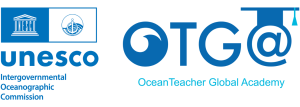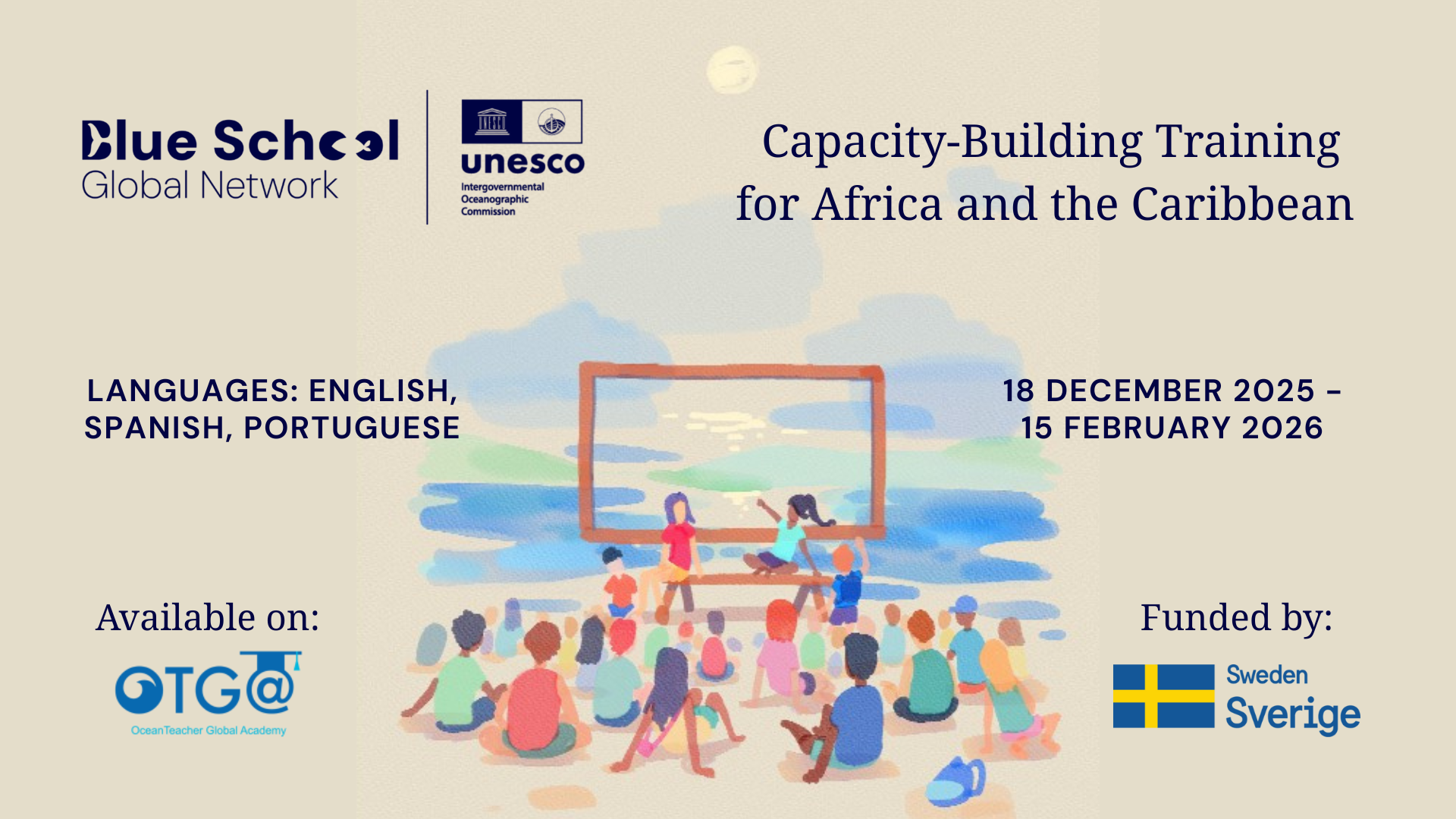
Blue Schools Capacity-Building Training – Africa & Caribbean Regions for teachers and coordinators
Capacity-building training for teachers to implement and expand the Blue School Programme. Modules for Teachers and Educators, focus on pedagogical approaches, project-based learning, community engagement, and integration of Ocean Literacy into curricular disciplines.
Learning outcomes
Course content
M1: course structure and introduction
M2: What is a blue school?
M3: Becoming a Blue School
M4 : teacher testimonies
M5: Partner Network and inspiring projects
M6: Lighthouse training – junior coastal monitoring
Language of instruction
English, Spanish, Portuguese
Instructors
Raquel Lorenz Costa, IOC–UNESCO; invited partners.
Natacha Moreira (Oceano Azul Foundation)
Hugo Jesus (Oceanário de Lisboa)
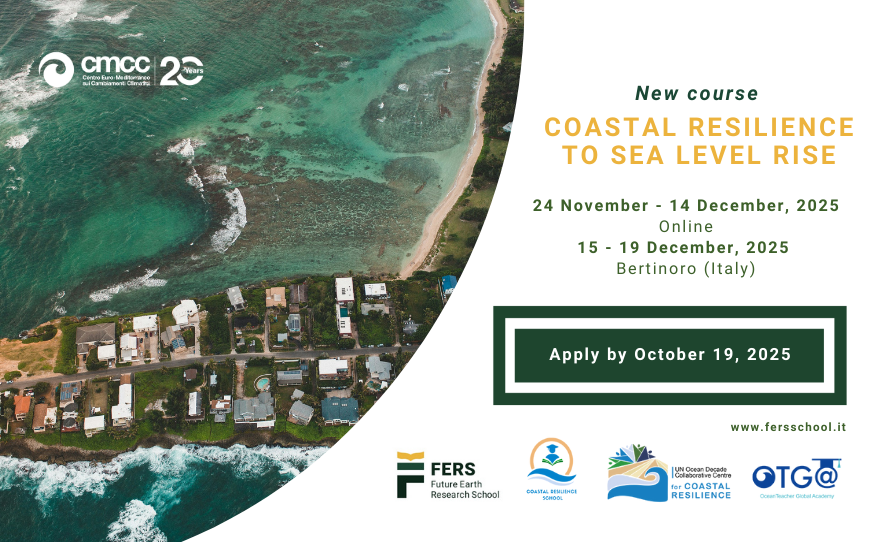
CRSLR_2025
Coastal Resilience to Sea Level Rise
course summary
rise is one of the most pressing challenges facing coastal communities, ecosystems, and infrastructure around the world. Understanding the risks, causes, and impacts of rising sea levels and the consequences on coastal regions is pivotal to design effective adaptation strategies and policies to enhance climate resilience.
the driving physical processes—such as ocean thermal expansion, polar ice melt, glacial retreat, and atmospheric dynamics—as well as the human and ecological impacts – such as increased coastal flooding, saltwater intrusion, habitat loss, and displacement of communities.
tools like flood modelling and vulnerability mapping.
Understand of the physical processes driving SLR risks
Asses regional vulnerabilities and coastal risks
(provide EXAMPLES) for planning and decision-making
, industry and high level education institutions
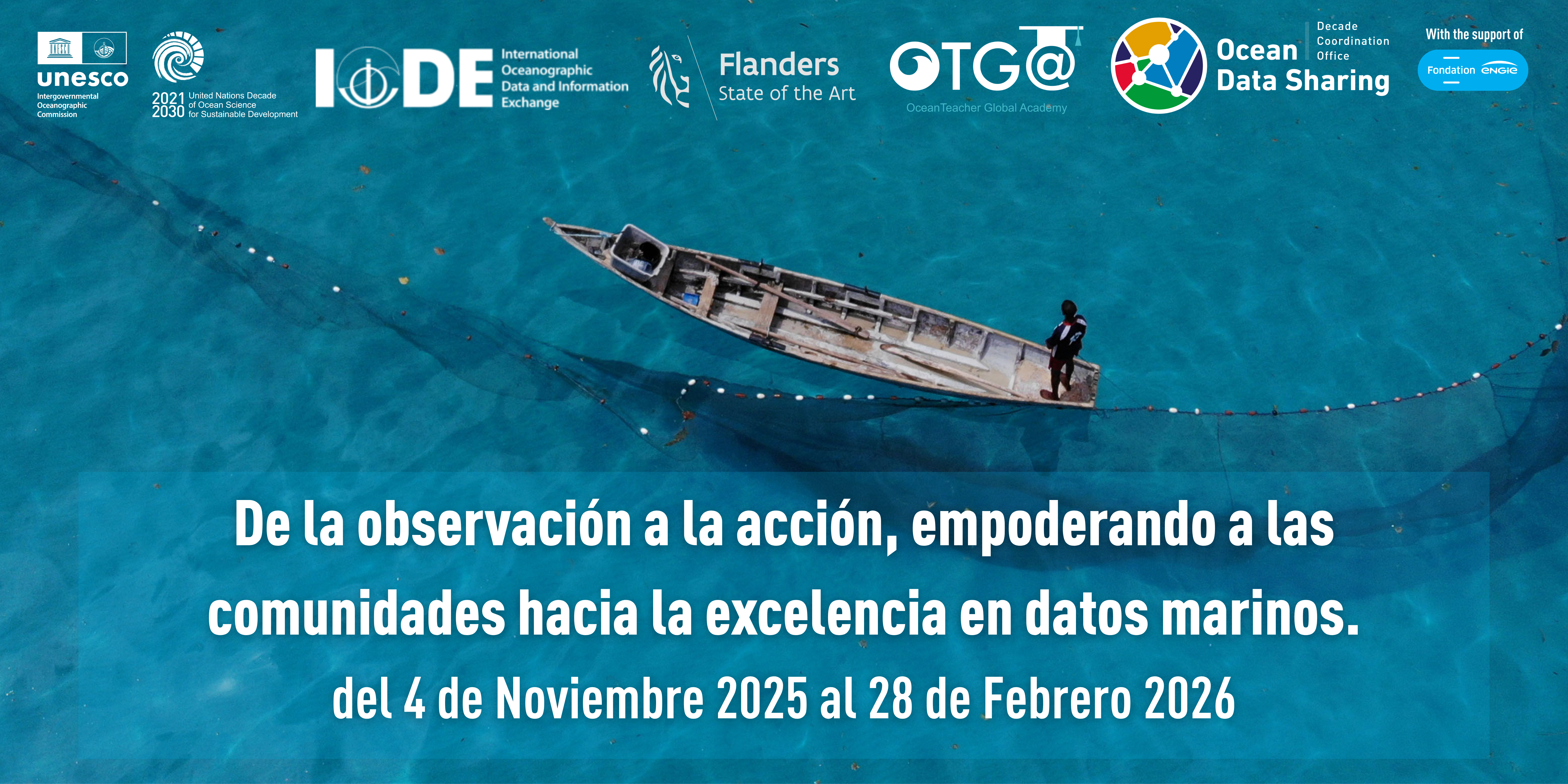
MDExc-2025ES
De la observación a la acción, empoderando a las comunidades hacia la excelencia en datos marinos.
Este curso tiene como objetivo desarrollar experiencia profesional en manejo de información y promover el conocimiento en datos para personas que trabajen en la producción, gestión y uso de datos oceánicos, en línea con lo establecido en el Plan de Implementación de la Estrategia de Datos e Información del Decenio de los Océanos. Asi mismo, busca brindar herramientas a los líderes de la región para fortalecer y consolidar sus comunidades de práctica.
Resultados generales de aprendizaje
Al completar con éxito esta capacitación, los participantes podrán:
- Apoyar la participación de la comunidad y desarrollar oportunidades de aprendizaje para capacitar a otros en sus propios países y regiones sobre datos oceánicos.
- Iniciar y liderar sus propias comunidades de práctica locales o regionales sobre datos oceánicos.
- Desempeñar un papel destacado en la comunidad de práctica global de la Oficina de Coordinación del Decenio para el Intercambio de Datos Oceánicos.
- Liderar la cooperación transfronteriza en temas específicos de interés para el intercambio de datos.
Contenido y planificación del curso
Cuatro bloques de tres temas con sesiones en vivo.
Cada tema consistirá en:
- Una clase de una hora pregrabada para que los participantes puedan verla a su propio ritmo.
- Tiempo de discusión de seguimiento en línea, en grupos.
- Actividades para reforzar el aprendizaje
Módulo 1 (Noviembre 2025)
1.1 Introducción: Por qué la gestión de datos oceánicos, incentivos para compartir datos y el panorama global de datos oceánicos
- Objetivo: Proporcionar una introducción y visión general del curso; describir algunos impactos, beneficios y motivaciones para compartir datos oceánicos bien gestionados; ofrecer una visión general de las redes e iniciativas globales y regionales de intercambio de datos oceánicos.
- Resultado: Los participantes podrán explicar a otros por qué es importante gestionar y compartir datos oceánicos y qué opciones existen para hacerlo a escala global.
1.2 Comprendiendo los roles: Marco de Calidad de IODE, pasos, roles de los individuos
- Objetivo: Introducir el Marco de Calidad que utiliza IODE para gestionar y compartir datos oceánicos en su red; describir los distintos roles dentro del marco y cómo se relacionan con una comunidad de práctica de datos oceánicos.
- Resultado: Los participantes podrán describir los roles necesarios en una comunidad de práctica en torno a los datos oceánicos y el marco de calidad en el que se desarrolla la actividad.
1.3 Identificando su comunidad de datos oceánicos: ¿Con quién interactuará? y ¿A quién apoyará y entrenará?
- Objetivo: Ayudar a los participantes a evaluar quién forma parte de su comunidad de datos oceánicos y cuáles son las necesidades de aprendizaje/formación de esa comunidad.
- Resultado: Los participantes podrán identificar el propósito de su comunidad de práctica, así como identificar e invitar a posibles miembros.
Módulo 2 (Diciembre 2025)
2.1 Planificación: Haciendo que sus proyectos y programas marinos prioricen los datos
- Objetivo: Explicar el proceso de planificación de la gestión de datos y cómo beneficia su priorización a un proyecto o programa
- Resultado: Los participantes podrán liderar la planificación de gestión de datos en su organización o comunidad de práctica
2.2 La importancia de la calidad de los datos
- Objetivo: Introducir a los participantes a diversos problemas de calidad de datos en diferentes situaciones, que pueden estar fuera de su área de especialización, y a los impactos de la reutilización de datos en la calidad de los mismos
- Resultado: Los participantes tendrán una visión general de la importancia en la calidad de los datos oceánicos y podrán orientar a sus comunidades de práctica sobre recursos clave.
2.3 Construyendo su comunidad de datos oceánicos
Objetivo: Dotar a los participantes de habilidades para construir una comunidad de práctica en gestión e intercambio de datos oceánicos.
Resultado: Los participantes estarán seguros de su capacidad para hacer crecer una comunidad de práctica a partir de los miembros potenciales identificados en el Módule 1.
Módulo 3 (Enero 2026)
3.1 Poniendo los datos en acción: Compartir datos oceánicos para generar conocimiento y acción
- Objetivo: Capacitar a las comunidades de práctica para comprender cómo preparar datos para compartirlos y en dónde. Así como algunas herramientas que se pueden usar para generar conocimiento.
- Resultado: Los participantes podrán promover el intercambio de datos en sus comunidades de práctica y asesorar sobre buenas prácticas.
3.2 ¿Cómo obtener reconocimiento por compartir mis datos? De compartir a publicar datos
- Objetivo: Ayudar a los participantes a entender la diferencia entre compartir datos y publicarlos y sus beneficios. Cómo comenzar y cómo usar identificadores de objetos digitales (DOI) para conjuntos de datos.
- Resultado: Los participantes podrán explicar el proceso de publicación de datos a sus comunidades de práctica y reconocer las opciones para permitir la citación formal de los conjuntos de datos creados por sus comunidades.
3.3 Creando espacios de aprendizaje en su comunidad de datos oceánicos
- Objetivo: Una actividad clave de las comunidades de práctica es compartir conocimiento y ayudar a los miembros a aprender entre ellos. Esta sesión se centra en los aspectos clave de un entorno de aprendizaje saludable basado en pares, seguido en el Bloque 4 por una sesión sobre diseño de sesiones de aprendizaje efectivas.
- Resultado: Los participantes podrán fomentar entornos apropiados en sus comunidades de práctica para permitir el crecimiento y desarrollo de sus miembros.
Módulo 4 (Febrero 2026)
4.1 Qué es la red IODE y quién participa
- Objetivo: La red IODE es la principal red global de intercambio de datos oceánicos y consta de varios componentes. Esta sesión dará a los participantes una introducción sobre la composición de la red IODE y su alcance de trabajo.
- Resultado: Los participantes podrán presentar la red IODE a sus comunidades de práctica y alinear las actividades de la comunidad con las actividades de IODE, incluyendo la colaboración con Centros Nacionales de Datos Oceanográficos y Unidades de Datos Asociadas.
4.2 Obtener apoyo organizacional y aceptación
- Objetivo: Las comunidades de práctica de datos a menudo están involucradas en cambios organizacionales; obtener acogida o apoyo para sus actividades es clave. Esta sesión dotará a los participantes de herramientas para aumentar el perfil y la participación de sus comunidades de práctica, logrando un mayor impacto.
- Resultado: Los participantes estarán equipados con habilidades y conocimientos para comunicar eficazmente el trabajo de sus comunidades a diferentes interesados y obtener aceptación de los tomadores de decisiones.
4.3 Diseñando aprendizaje
- Objetivo: Las Comunidades de Práctica apoyan a sus miembros ofreciendo oportunidades de aprendizaje focalizadas. Esta sesión introducirá conceptos para diseñar oportunidades de aprendizaje efectivas.
- Resultado: Los participantes podrán planificar sesiones de formación efectivas y específicas para desarrollar habilidades dentro de sus comunidades de práctica.
Seguimiento (Q1 2026)
Los organizadores del curso planean organizar (siempre que sea posible) sesiones presenciales de seguimiento para complementar la hoja de ruta de la formación. Estas sesiones se organizarán en diferentes regiones del mundo, previa confirmación de la disponibilidad de expertos y recursos, y, en la medida de lo posible, coincidirán con conferencias u otros eventos a los que sea probable la asistencia de los participantes. Se recomienda encarecidamente la participación en los eventos presenciales, pero no es obligatoria. Para los participantes que no asistan al seguimiento presencial, se organizará una sesión complementaria en línea, que será obligatoria para completar este curso.
- Objetivos: Proporcionar espacios presenciales para dar seguimiento al contenido del curso de formación de entrenadores y desarrollar hojas de ruta individuales de acción, cuya implementación se seguirá en línea.
- Resultados: Los participantes habrán desarrollado planes de acción personales para poner en práctica las habilidades adquiridas durante el curso y habrán organizado la primera sesión de seguimiento con los líderes del curso.
La información sobre estas sesiones se actualizará [AQUÍ] una vez confirmadas.
- Buen conocimiento práctico del inglés (*el curso se impartirá en varios idiomas, pero los recursos externos pueden estar en inglés).
- Conocimientos básicos de informática.
- Se recomienda tener conocimientos de gestión de datos oceánicos (haber completado el curso OTGA).
- Conocimiento de datos oceánicos.
Idioma de instrucción
Inglés y español
Instructores y organizadores
El contenido de este curso fue proporcionado por:
- Adam Leadbetter
- Rob Thomas
- Jan-Bart Calewaert
- Ana Carolina Mazzuco
- Taco de Bruin
- Peter Burger
- Margarita López-Velosa
- Otros instructores de cada región (por confirmar)
Esta capacitación está organizada por Decade Coordination Office for Ocean Data Sharing en colaboración con la Ocean Decade Coordination Unit y la UNESCO IOC OceanTeacher Global Academy (Programme Component of IODE).
Evaluaciones y certificados
Este curso incluye un conjunto de evaluaciones automatizadas en línea con múltiples preguntas para evaluar su aprendizaje y un plan de acción final que se desarrollará e implementará individualmente. Los participantes deberán completar una autoevaluación previa y posterior relacionada con el contenido del curso, y se les solicitará que completen una encuesta de retroalimentación al final del curso para reflexionar sobre su experiencia de aprendizaje e identificar áreas de mejora. Esto también proporcionará retroalimentación valiosa para los profesores y organizadores del curso para mejorar futuras sesiones de capacitación.
Para recibir un Certificado de Finalización, los estudiantes deben:
- Obtener una puntuación mínima del 80% en todos los cuestionarios;
- Completar todas las lecciones, actividades y evaluaciones;
- Realizar el pretest y el posttest obligatorios;
- Desarrollar e implementar un plan de acción;
- Participar en sesiones en vivo en línea (75% de asistencia);
- Enviar el formulario de retroalimentación requerido, obligatorio para todos los cursos de OTGA.
Una vez completado el curso, se invitará a los participantes a participar en las reuniones mensuales y de seguimiento con el DCO para el Intercambio de Datos Oceánicos para continuar con el desarrollo de la red y la capacitación futura de otros participantes.
Requisitos tecnológicos
Para completar este curso, los participantes deben tener acceso a:
- Computadora con un sistema operativo moderno (Windows, macOS o Linux)
- Última versión de los navegadores web Chrome, Edge, Firefox o Safari
- JavaScript y cookies habilitados
- Acceso a internet de banda ancha (ancho de banda mínimo de 0.5 Mbps (Recepción y Envío))
- Altavoces o auriculares, micrófono
Duración y formato del curso
Este curso se impartirá en formato semipresencial, combinando actividades en línea a su propio ritmo, sesiones y evaluaciones dirigidas por el instructor, y trabajo práctico. La duración total del curso (bloques 1, 2, 3 y 4 y actividades relacionadas) es de 25 horas.
Programa de sesiones en vivo en línea:
18 de noviembre de 2025 (Módulo 1)
16 de diciembre de 2025 (Módulo 2)
5 de febrero de 2026 (Módulo 3)
5 de marzo de 2026 (Módulo 4)
Tenga en cuenta que el curso de capacitación puede complementarse con un módulo de seguimiento presencial, que se programará en 2026. Las fechas y el lugar se confirmarán por región.
Costo: Este curso no tiene costo de matrícula.
Cómo participar
La participación en esta capacitación es solo por invitación y se coordina en colaboración con los Comités Nacionales, las Oficinas de Coordinación y los Centros del Decenio de los Océanos.
Contatos
- DCO Ocean Data Sharing: oceandatasharing@unesco.org
- OTGA Secretariat: ioc.training@unesco.org
Para cualquier consulta por favor contactar con la Secretaría de OTGA utilizando siempre el nombre del curso como asunto del correo electrónico.
Política de cancelación
En caso de cancelación del curso por parte de la OTGA o sus afiliados, se notificará con al menos 7 días de antelación. En caso de cancelación por parte del asistente, se nos notificará con al menos 7 días de antelación.
OceanExpert announcement: https://oceanexpert.org/event/4869
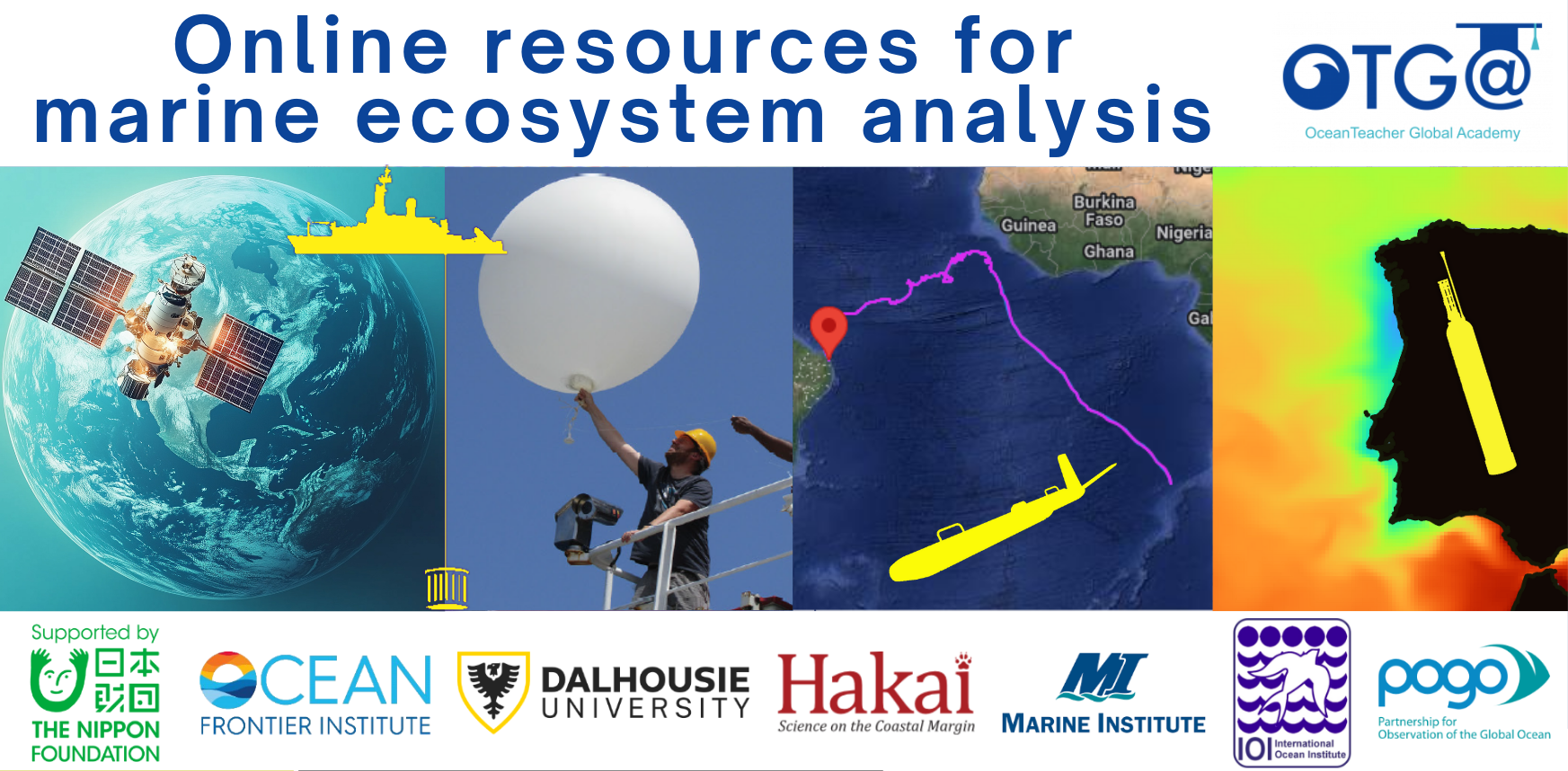
ROAEM25-Canada
NF-POGO Centre of Excellence. Online resources for marine ecosystem analysis 2025
This introductory training is designed for participants beginning to work with online ocean data. The course provides practical guidance on accessing freely available in situ and remote oceanographic datasets, and on using open-source software tools to generate basic ocean data products. Participants will gain experience in obtaining key oceanographic variables—including data from the World Ocean Database, sea surface temperature, chlorophyll-a concentration, wind, and surface currents—and in visualizing and processing them to support initial analysis and assessment of meso- to large-scale marine and coastal ecosystems.
Venue
Marine Institute of Memorial University. St Johns, Newfoundland, Canada
Learning outcomes
As a result of this course, CofE scholars will acquire basic knowledge to:
- Obtaining relevant oceanographic variables such as ocean surface temperature, chlorophyll-a concentration, surface currents,
- Visualising and developing products to support initial, analysis and assessment of meso to large-scale marine and coastal ecosystems.
Target audience
The training is open to the 10 CofE scholars. More information on the training programme at https://www.ofi.ca/programs/centre/program
Pre-requisites:
Participants must:
-
Have prior knowledge of oceanography;
-
Bring their own laptop;
-
A working knowledge of English.
Course content
Module 1: Introduction to Ocean Observation
- Importance of observational oceanography and the Global Ocean Observing System
- Platforms for collecting and visualising oceanographic data
Module 2: Defining Area of Interest & Folder structure
- Selection and delimitation of area of interest.
- Organisation of folder structure and file names
Module 3: Ocean Data View & World Ocean Data database
- The World Ocean Database (WOD), select and download WOD data
- The Ocean Data View (ODV), download and install ODV
- Create data collection on ODV
- Import and analyse WOD data on ODV
- Quality control on ODV
- Prepare and export products on ODV
- Geographic Coordination System and Basic GIS file formats
- QGIS, download and install, basic layout
Module 5: Creating a GIS project with basic marine and auxiliary data
- Sources of basic, auxiliary data sources for marine GIS
- Import shape and raster format data into the GIS
- Shape and raster layers clipping
- Prepare map figure
- Obtain Essential Ocean Variables from diverse portals
- GIS tools such as interpolation, clipping with masks, extract isolines from raster, raster calculator, derive vectors from scalar components
Module 7: Online visualisation of oceanographic products
- Acquaint with oceanographic data portals and their basic tools for plotting and consulting oceanographic parameters of interest
- Export products (figures, plots, data, GIS format files)
Language of instruction: English
Duration, Synchronous Sessions, and Format
The training will take place face-to-face between 24 to 28 November, 2025, with a duration of approximately 35 hours.
Live sessions are planned from Monday to Friday, from 9:00-12:30 and 13:30-17:00.
The course has an online learning component to complement the learning activities and assessments. Live online sessions may be broadcasted if one or more scholars are not able to be present on-site.
Instructors
Organizers
Participation
This course is offered by NF-POGO Centre of Excellence in Observational Oceanography programme to its scholars.
POGO and UNESCO are committed to promoting equal access principles. Participation from minority or underrepresented groups are strongly encouraged.
Assessment & Certificate
Participants will carry out guided exercises in the classroom and OTGA e-Learning platform, focusing first on a shared Area of Interest (AOI). They will then apply the same methods individually to a second AOI of their choice. On the final day, each participant will present their results to the group, demonstrating the skills acquired throughout the training. The 12 assignments and the final presentation will be graded, and sucessfull completion will require achieving 70% passmark.
Contacts
- Course Coordinator: Lilian A. Krug lakrug@ualg.pt
- OTGA Secretariat: ioc.training@unesco.org
Costs
Free of charge. There are no tuition fees.
Cancellation policy
In the event of cancellation of the course by the OTGA or its affiliates, we will provide notification of cancellation at least 7 days prior to the course date. In the event of cancellation by the attendee, we should receive notification of cancellation at least 7 days prior to the course date.
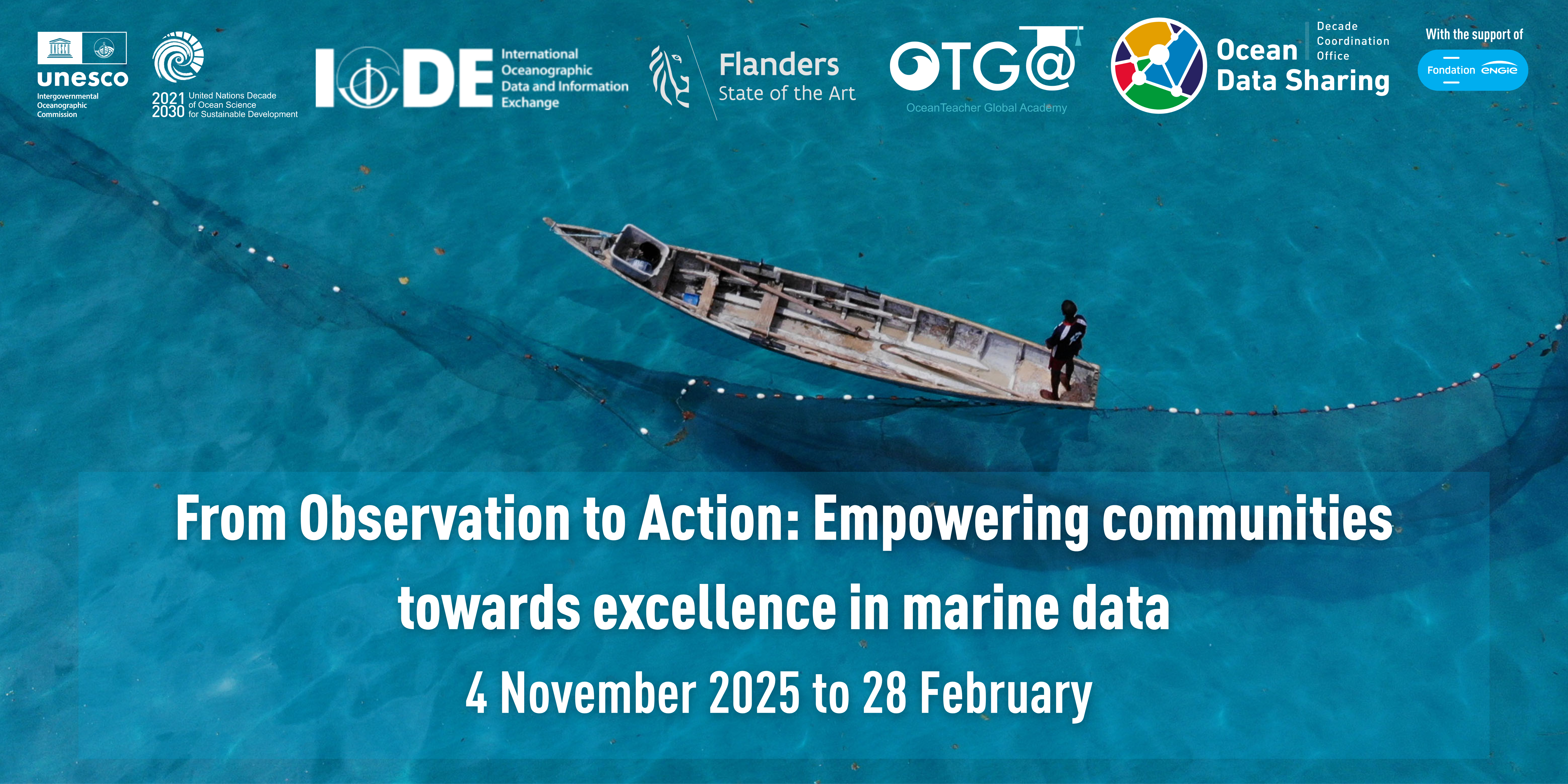
MDExc-2025EN
From Observation to Action: Empowering communities towards excellence in marine data
This course aims to equip ocean data leaders in regions across the globe with the knowledge and tools to grow their own communities of practice, thereby developing professional expertise and data literacy for ocean data producers, curators, and users as identified in the Ocean Decade’s Data Strategy Implementation Plan.
General learning outcomes
Upon successful completion of this training, participants will be able to:
- Support community buy-in and develop learning opportunities to train others within their own countries and regions about ocean data
- Seed and lead their own local or regional ocean data Communities of Practice
- Play leading roles in the Decade Coordination Office for Ocean Data Sharing’s global Community of Practice
- Lead cross-border cooperation on specific data sharing topics of interest
Course content & planning
Four modules of three topics delivered on-online with targeted, in-person follow-up.
Each topic will consist of:
- One one-hour lecture - pre-recorded to allow learners to watch at their own pace
- Follow-up discussion time - online, in groups
- Activities to re-inforce the learning
Module 1 (November 2025)
1.1 Setting the scene: Why ocean data management, incentives to sharing data, and the global ocean data landscape
-
- Aim: To provide an introduction and overview to the course; to describe some of the impacts, benefits and motivations in sharing well-managed ocean data; to give an overview of the global and regional ocean data sharing networks and initiatives.
- Outcome: Learners will be able to explain to others why it is important to manage and share ocean data and what options are available to make this happen at a global scale
1.2 Understanding roles: The IODE Quality Framework, Steps, Roles of Individuals
-
- Aim: To give an introduction to the Quality Framework that IODE uses to manage and share ocean data across its network; to outline the various roles that exist within the framework and how these relate to an ocean data community of practice
- Outcome: Learners will be able to describe the key roles that are needed in an ocean data community of practice and the quality framework that activity sits within
1.3 Identifying your ocean data community: Who will you engage with, support, and train?
-
- Aim: To help learners consider who their ocean data community is and what the focus of learning/training needs in that community is
- Outcome: Learners will be able to identify the purpose of their community of practice, and to identify and invite potential members
Module 2 (December 2025)
2.1 Planning: making your marine projects and programmes “data first”
-
- Aim: To explain to learners the Data Management Planning process and how it helps in making a project or programme “data first’
- Outcome: Learners will be able to lead in Data Management Planning in their organisation or community of practice
2.2 Quality data matters
-
- Aim: To introduce learners to a range of thematic data quality issues, which may be beyond their normal area of expertise and to the impacts of data quality on the re-use of data in a range of ocean applications
- Outcome: Learners will have an overview of the importance of ocean data quality which they can bring to their communities of practice and be informed of key resources which they can point their communities of practice
2.3 Building your ocean data community:
-
- Aim: To equip learners with skills in building a community of practice in ocean data management and sharing
- Outcome: Learners will be confident in their ability to grow a community of practice from the potential members identified in Block 1.
Module 3 (January 2025)
3.1 Putting data to work - sharing ocean data to enable insight and action
-
- Aim: To enable communities of practice to understand how to prepare data for sharing, where to share and some tools that can be used to share data which can then be used in creating insights
- Outcome: Learners will be able to encourage data sharing in their communities of practice, and advise on best practices, technology choices, etc
3.2 How do I get credit for sharing my data? Moving from data sharing to data publication
-
- Aim: To help learners to understand the difference between sharing data and formal data publication, the benefits of data publication, how to get started, and how to use digital object identifiers for datasets
- Outcome: Learners will be able to describe data publication to their communities of practice and be aware of options to allow for formal citation of datasets created by their communities of practice
3.3 Creating learning spaces in your ocean data community
-
- Aim: A key activity of communities of practice is sharing knowledge and helping members to learn from each other. This session will focus on the key aspects of a healthy peer-based learning environment, and will be followed in block 4 by a session on designing effective learning sessions
- Outcome: Learners will be able to foster healthy environments in their communities of practice to allow the growth and development of members
Module 4 (February 2026)
4.1 What is the IODE network and who is involved
-
- Aim: The IODE network is the key ocean data sharing network globally and consists of a number of components. This session will introduce learners to the makeup of IODE’s network and its scope of work
- Outcome: Learners will be able to introduce the IODE network to their communities of practice and to align activities of the community to IODE activity, including working alongside National Oceanographic Data Centres and Associated Data Units
4.2 Getting organisational support and buy-in
-
- Aim: As data communities of practice are often engaged in organisational change, getting buy-in or support for their activities is key. This session will equip learners with tools to help with raising the profile of and engagement with their communities of practice leading to greater impact.
- Outcome: Learners will be equipped with skills and knowledge to effectively communicate the work of their communities of practice to a range of stakeholders and to get buy-in from decision makers
4.3 Designing learning
-
- Aim: Communities of Practice support their members by giving them focussed learning opportunities. This session will introduce the concepts in designing effective learning opportunities
- Outcomes: Learners will be able to plan effective and targeted training sessions to develop skills within their communities of practice
In-person Follow-up (2026)
- Aims: To provide in-person spaces to follow-up on the train-the-trainer course content and to develop individual roadmaps to action, implementation of which will be followed up online
- Outcomes: Learners will have developed personal action plans to put into practice the skills they have acquired throughout the course and have organised the first follow-up session with the course leaders
Information about these sessions will be updated [HERE] once confirmed.
Target audience & pre-requisites
This course was prepared for ocean practitioners and institutions interested in becoming focal points to collaborate with the Decade Coordination Office for Ocean Data Sharing in building a network of recommended practices around good data management and sharing.
Participation will require:
- Good working knowledge of English (*the course will be delivered in multiple languages, but external resources may be in English)
- Basic computer skills
- Knowledge of ocean data management is advised (completed the OTGA course)
- Knowledge of ocean data
Language of instruction
English and Spanish
Instructors and Organizers
Content for this course was provided by:
- Adam Leadbetter
- Rob Thomas
- Jan-Bart Calewaert
- Ana Carolina Mazzuco
- Taco de Bruin
- Peter Burger
- Margarita López-Velosa
- Other instructors from each region (to be confirmed)
This training is organized by the Decade Coordination Office for Ocean Data Sharing in collaboration with the the Ocean Decade Coordination Unit and the UNESCO IOC OceanTeacher Global Academy (Programme Component of IODE).
Assessments and Certificate
This course contain a set of online multiple-question automated assessments to evaluate your learning, and a final action plan to be developed and implemented individually. Participants will be required to complete a pre and post self-assessment related to the course content, and be requested to fill out a feedback survey at the end of the course to reflect on your learning experience and identify areas for improvement. This will also provide valuable feedback for course teachers and organisers to enhance future training sessions.
To receive a Certificate of Completion, learners must:
- Achieve a minimum score of 80% on all quizzes;
- Complete every lesson, activity, and assessment;
- Complete the mandatory pre-test and post-test;
- Develop and implement an action plan;
- Participate in online live sessions (75% attendance);
- Submit the required feedback form, which is mandatory for all OTGA courses.
After completion of the course, participants will be invited to join follow ups and monthly meetings with the DCO for Ocean Data Sharing to continue the network building and future training of other participants.
Technology requirements
To complete this course, participants should have access to:
- Computer with a modern operating system (Windows, macOS, or Linux)
- Latest version of either Chrome, Edge, Firefox or Safari web browsers
- JavaScript and cookies enabled
- Broadband internet access (minimum bandwidth of 0.5 Mbps (Receive and Send)
- Speakers or headphones, Microphone
Course duration and format
This course will be conducted in a blended format, through a combination of online self-paced activities, instructor led sessions and assessments, and hands-on work. The duration of the course (Blocks 1, 2, 3, and 4 and related activities) is a total of 25 hours.
Live sessions schedule:
18 November 2025
16 December 2025
5 February 2026
5 March 2026
Note that the training course may be complemented by face-to-face in-person follow-up module - to be scheduled in 2026 - dates and venue to be confirmed by region.
Cost: This course has no tuition fees.
How to participate
Participation in this training is invitation only, coordinated in collaboration with the National Committees, Coordination Offices and Centres of the Ocean Decade.
Contacts
- DCO Ocean Data Sharing: oceandatasharing@unesco.org
- OTGA Secretariat: ioc.training@unesco.org
For any questions please contact the OTGA Secretariat always using the name of the course as the email subject.
Cancellation policy
In the event of cancellation of the course by the OTGA or its affiliates, we will provide notification of cancellation at least 7 days prior to the course date. In the event of cancellation by the attendee, we should receive notification of cancellation at least 7 days prior to the course date.
OceanExpert announcement: https://oceanexpert.org/event/4867
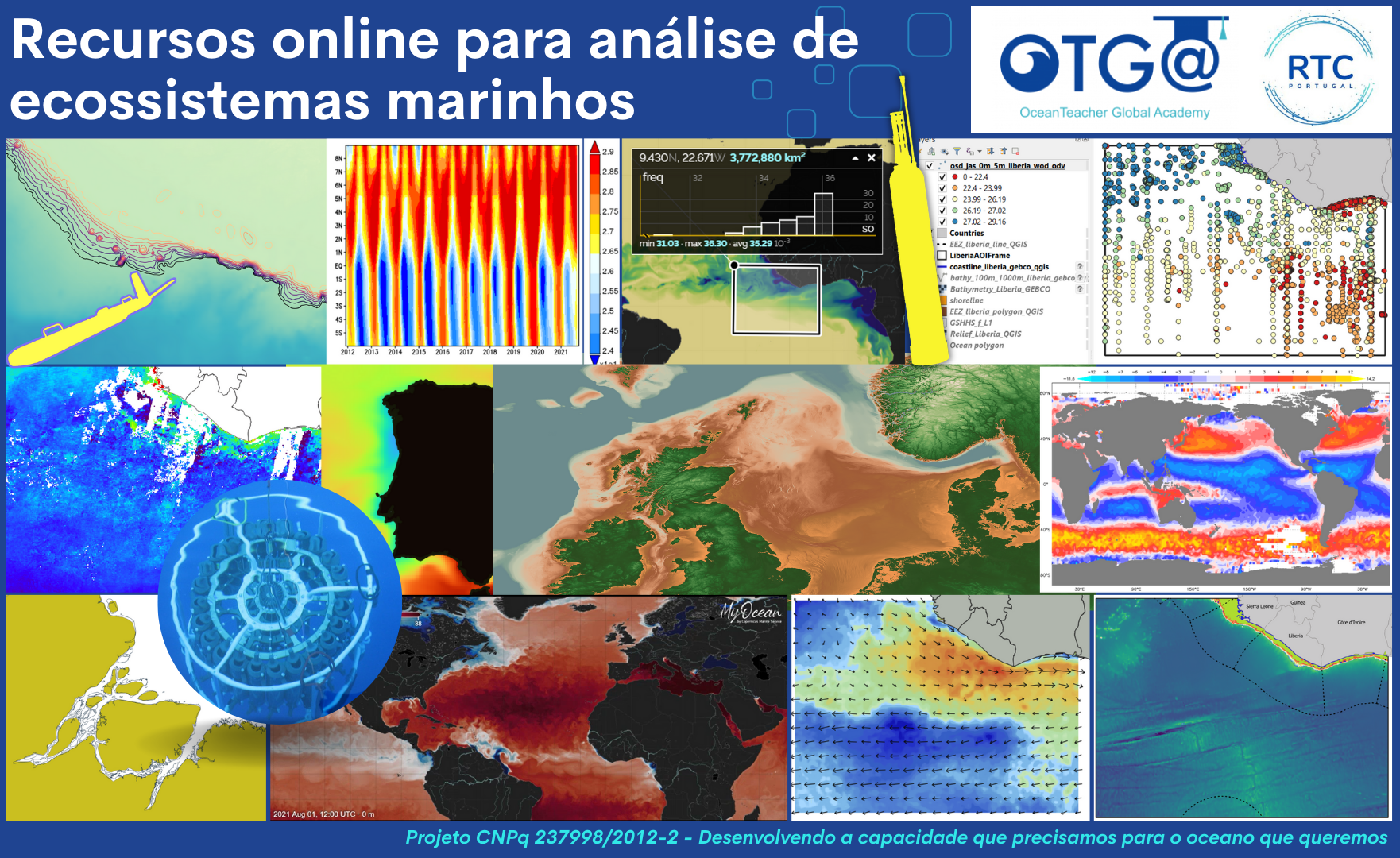
ROAEM2025-2
Recursos online para análise de ecossistemas marinhos (2º turma)
Neste curso online, os participantes aprenderão a aceder a dados oceanográficos in situ e remotos disponíveis gratuitamente online e a explorar software gratuitos para desenvolver dados e análises básicas de ecossistemas marinhos e costeiros de meso a larga escala. Trata-se de uma formação de nível introdutório, ideal para quem está dando os primeiros passos na utilização de dados oceanográficos.
Objetivos
Como resultado deste curso, os participantes irão adquirir conhecimentos básicos para apoiar uma análise inicial, de meso a grande escala, de ecossistemas marinhos e costeiros. Estes incluem:
- Obtenção de variáveis auxiliares (e.g., limites administrativos, batimetria) e oceanográficas (e.g., temperatura da superfície do mar, concentração de clorofila-a)
- Funções básicas em Sistemas de Informação Geográfica (SIG) em software geral (QGIS) e específicos à oceanografia (Ocean Data Viewer)
- Visualização e o desenvolvimento de produtos online e em ambiente SIG.
Resultados de aprendizagem
No final deste curso, os participantes deverão ser capazes de:
- Descrever as variáveis oceanográficas mais relevantes, assim como os instrumentos necessários para a recolha de dados
- Utilizar de software de acesso livre para síntese de dados e análises
- Descobrir fontes e utilizar dados oceanográficos multi-paramétricos
- Desenvolver produtos para compreender e monitorizar ecossistemas marinhos e costeiros a partir de diversas fontes, utilizando programas computacionais selecionados.
Conteúdo
Módulo 1: Introdução a Observação do Oceano
- Importância da oceanografia observacional e do Sistema Global de Observação do Oceano (GOOS)
- Plataformas de observação e amostragem
Módulo 2: Definição de Área de Interesse (AoI) e estrutura de pastas
- Seleção e delimitação da área de interesse.
- Organização da estrutura de pastas e nomes de arquivos
Módulo 3: Ocean Data View & World Ocean Data database
- World Ocean Database (WOD), selecionar e baixar dados WOD
- Ocean Data View (ODV), baixar e instalar ODV
- Criar coleção de dados no ODV
- Importar e analisar dados WOD no ODV
- Controle de qualidade no ODV
- Preparar e exportar produtos no ODV
Módulo 4: Introdução a Sistemas de Informação Geográfica (SIG) & QGIS
- Sistema de Informação Geográfica e formatos básicos de arquivos SIG
- QGIS, baixar e instalar, interface do usuário
Módulo 5: Criar um projeto SIG com dados auxiliares e dados marinhos simples
- Fontes de dados marinhos simples e auxiliares para SIG
- Importar dados de formato vetorial (shape) e matriz (raster) no SIG
- Recorte de camadas vetoriais (shape) e matriciais (raster)
- Preparar e exportar figura cartográfica
Módulo 6: Importar Variáveis Essenciais do Oceano (EOVs)
- Obter EOVs a partir de diversos portais
- Ferramentas de SIG tais como interpolação, recorte com máscaras, extração de isolinhas, cálculos, derivação de vetores de componentes escalares
Módulo 7: Visualização online de produtos oceanográficos
- Familiarização com portais de dados oceanográficos e suas ferramentas básicas para plotagem e consulta de variáveis de interesse
- Exportar produtos (figuras, plots, dados, arquivos de formato SIG)
Público-alvo
Alunos de graduação (bacharelado) e pós-graduação (mestrado e doutorado), e profissionais em início de carreira nas áreas de oceanografia, ciências do mar, biologia marinha e/ou afins.
Idioma: Português
Instrutores/Organizadores
1 Partnership for Observation of the Global Ocean (POGO)
2 Centre of Marine Sciences of the Algarve (CCMAR)
Duração e formato do curso:
O curso terá lugar on-line maioritariamente em modo assíncrono. O curso inclui cerca de 7 horas de trabalho individual assíncrono, por semana, num total de cerca de 30 horas de trabalho, a serem concluídos no período entre 3 de novembroe 28 de novembro de 2025. Os módulos do curso devem ser concluídos sequencialmente.
Caso os organizadores considerem necessário, poderão organizar-se algumas sessões síncronas para discussão ou esclarecimento de dúvidas. Em todo o caso, haverá assistência assíncrona durante o curso.
Pré-requisitos tecnológicos:
- Computador com sistema operativo Windows
- Versão mais recente dos browsers Chrome (preferencial) e Firefox
- Direitos de administrador no computador/laptop a utilizar durante o curso
- Java Runtime Engine (Java 9 JRE) instalado ou 70 MB de espaço para o instalar
- Processador Intel® Core™ i3 ou similar/superior
- Espaço em disco de 3 GB ou mais
- 2 GB ou mais de RAM
- QGIS versão 3.40 ou a mais recente (estável) disponível no momento do curso
Nota: o curso destina-se a utilizadores de Windows
Avaliação / Certificado
Um certificado de participação será emitido se todos os segmentos dos módulos do curso forem concluídos e um mínimo de 70% for alcançado no total das avaliações (questões de múltiplas respostas, V/F, exercícios).
Processo de candidatura
O número de lugares disponíveis é limitado (Até 30 brasileiros e até 5 de outras nacionalidades de língua portuguesa). Preencha o formulário de inscrição on-line disponível em: https://otga.wufoo.com/forms/mjmsj321vy21wr/
O prazo para submissão da candidatura é 5 outubro, 2025 (23:59 CET: Central European Time). Critérios de seleção:
- Alunos de graduação (bacharelado) e pós-graduação (mestrado e doutorado), e profissionais em início de carreira nas áreas de oceanografia, ciências do mar, biologia marinha e/ou afins.
- Fluência em Português e conhecimentos práticos de inglês
- Competências informáticas básicas
- Preferência a candidatos brasileiros que não tenham participado em formações anteriores semelhantes no âmbito do OTGA
Custos: Não se aplicam propinas ou taxas de inscrição.
A UNESCO está empenhada em promover os princípios de igualdade de acesso. As inscrições de grupos minoritários ou sub-representados são fortemente encorajadas.
Em caso de dúvidas entre em contato com a Secretaria da OTGA (ioc.training@unesco.org) usando sempre o nome do curso como assunto do e-mail.
Política de cancelamento
Em caso de cancelamento do curso pela OTGA ou afiliados, notificaremos o cancelamento pelo menos 7 dias antes da data do curso. Em caso de cancelamento pelo participante, deveremos receber notificação de cancelamento pelo menos 7 dias antes da data do curso.
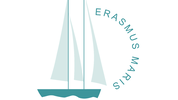
ERASMUSMARIS-25Spain
Erasmus Maris 2025: From sampling and analysis of microplastics to data
This training course, part of the Erasmus Maris initiative, engages secondary schools in key phases of marine science through a mix of formal and hands-on learning. Focused on microplastic pollution, students will sample and analyze environmental data while gaining an introduction to databases and the Erasmus Maris workflow. Collaboration and teamwork are central, and the training concludes with a certificate ceremony recognizing participants' achievements.
Who is it for?
Secondary school teachers and facilitators - Secondary school students with an interest in environmental science, marine biology, or related fields. Students should have a basic understanding of scientific concepts, particularly those related to ecology, biology, and chemistry. Students should be familiar with basic laboratory techniques and fieldwork procedures (15 years and older).
Venue
Learning Outcomes
Knowledge:
- Recall key terms related to microplastic pollution.
- Identify the main environmental impacts of microplastics.
- Identify different types of microplastics commonly found in aquatic environments
- List the different abiotic factors relevant to marine ecosystems.
Comprehension:
- Describe the importance of microplastics analysis in environmental research.
Applying:
- Collaborate with peers to implement the sampling protocol for collecting microplastic samples in various aquatic environments.
- Measure abiotic factors in aquatic ecosystems.
- Apply the Erasmus Maris protocol to analyse environmental samples.
- Prepare data and metadata in appropriate formats.
Analysis:
- Interpret data collected during the training week and compare microplastic concentrations between rivers and seas and/or between different samples.
Synthesis and evaluation:
- Assess the environmental impact of microplastic pollution based on the data collected.
- Overview of microplastics and their environmental impact
- Importance of microplastics analysis in environmental research
- Main microplastic pollution pathways: From rivers to the sea
- How to organize and conduct microplastics sampling in aquatic environments
- How to analyze microplastics environmental samples
- Additional Activities:
- Evaluation and Feedback
- Active participation in sampling and analysis activities
- Participation and level of engagement: Observation of students' involvement in team-building activities, workshops, and discussions.
- Assessment of the Tasks: Assessment of the learning outcomes related to the assigned activities (analysis of samples, presentations, and reporting on their findings).
- Practical Skills Demonstrations: Students should demonstrate their understanding and skills acquired through practical tasks (conduct of sampling procedures, analysis of samples)
- Feedback and Reflection: students will be encouraged to reflect on their experiences and provide feedback on their learning progress.
- Formal Evaluation: Quizzes, and tests to assess students' understanding of key concepts and knowledge gained.
Duration
This training is divided into 5 days, totaling 45 hours of activities.
Language of Instruction
English
Instructors
Kamel Labibes - Ayam Sailing Europe -ASE
John Seghers - European Commission - JRC
Piotr Robouch - European Commission - JRC
Emmy Pequeur - University of Ghent - UGhent
Julie Muyle - Flanders Marine Institute - VLIZ
Mattias Bossaer - Flanders Marine Institute - VLIZ
Organizers
TThis course is organized by JRC Geel and Ayam Sailing Europe (ASE), in collaboration with the University of Ghent and VLIZ, with the support of UNESCO IOC OceanTeacher Global Academy.
Internal process. Each of the schools participating in the Erasmus Maris program, spread across EU different countries, have chosen six students to participate in the program. Applicants have expressed a genuine interest in environmental issues. presentation, and performance at school were also taken into account.
UNESCO is committed to promoting equal access principles. Applications from minority or underrepresented groups are strongly encouraged. For any questions please contact the OTGA Secretariat (ioc.training@unesco.org) always using the name of the course as the email subject.
Contacts:
- Dr Kamel Labibes: coordination@ayamsailing.eu
- OTGA Secretariat: ioc.training@unesco.org
In case of need for further clarifications please use the contacts above, always using as email subject.
Feedback survey
At the end of the course, you will be asked to fill out a feedback survey. This information will be used to improve future courses.
Cancellation policy
In the event of cancellation of the course by the OTGA or its affiliates, we will provide notification of cancellation at least 7 days prior to the course date. In the event of cancellation by the attendee, we should receive notification of cancellation at least 7 days prior to the course date.
Details: https://oceanexpert.org/event/4851
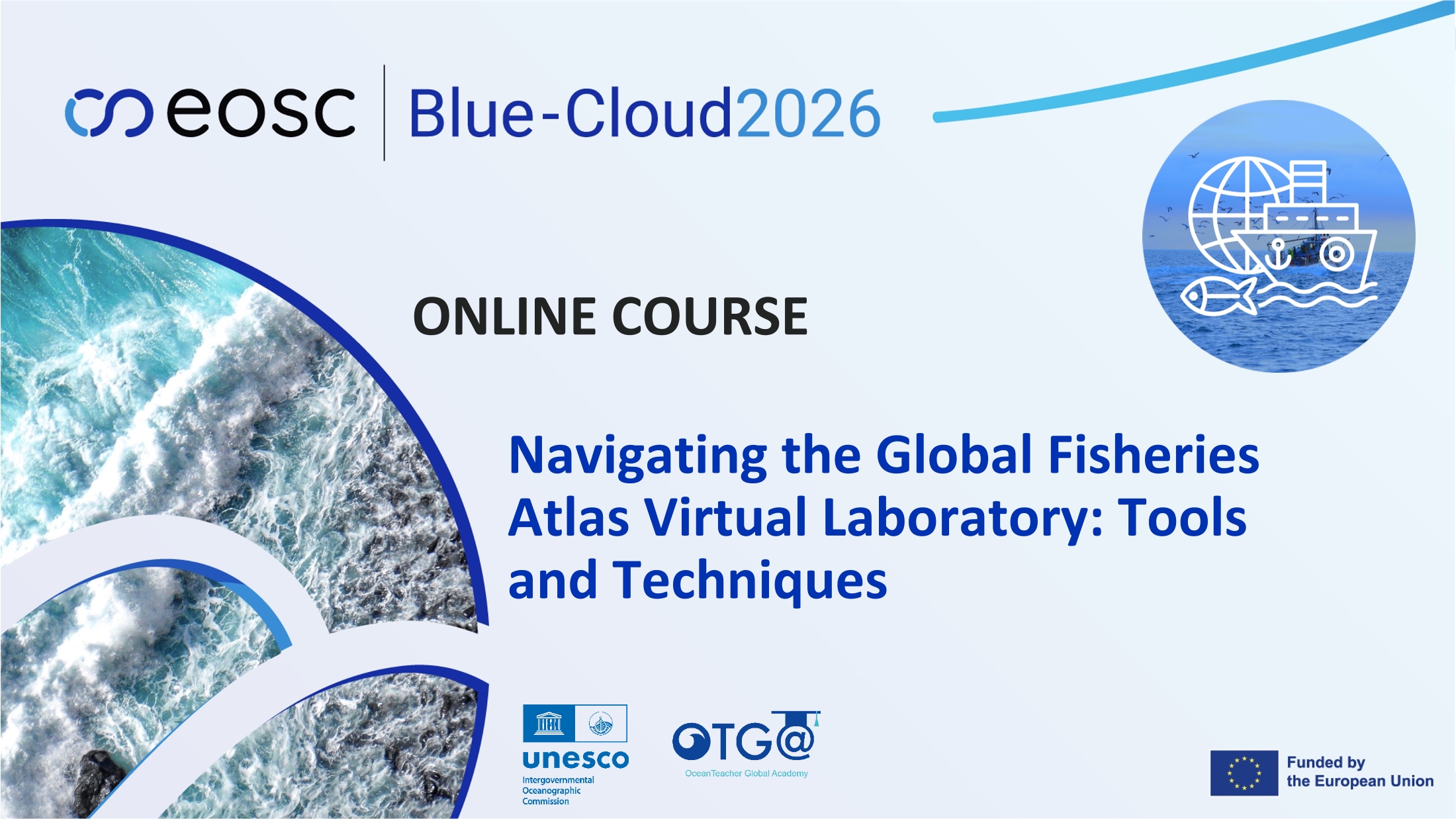
BC-VLab5*2025
Navigating the Global Fisheries Atlas Virtual Laboratory: Tools and Techniques
This 4-hour course empowers ocean scientists with a comprehensive understanding and practical skills for using the Global Fisheries Atlas Virtual Laboratory within the Blue-Cloud Virtual Research Environment (VRE). During this course, you will explore the benefits of standardized, FAIR fisheries data via a Virtual Laboratory (VLab). You will also get familiar with virtual facilities, either through graphic user interfaces (GUIs) or through programmatic access (APIs), and learn how to access web mapping products to browse the Global Record of Stocks and Fisheries (GRSF) and datasets describing Tuna Atlas fisheries globally. The course also provides methods to reproduce, update, and customize the systems for other use cases.
The aim of this course is to equip ocean scientists with the knowledge and skills to effectively navigate, utilize, and customize the Global Fisheries Atlas Virtual Lab for accessing, analyzing, and contributing to global fisheries data and research. Through hands-on experience with the Data-Interpolating Variational Analysis in n dimensions (DIVAnd) framework, participants will learn to integrate and analyze multi-source observational datasets to reconstruct and interpret surface ocean current patterns.
Learning outcomes
Upon successful completion of this training, participants will be able to:
- Describe the purpose and functionalities of the Global Fisheries Atlas Virtual Laboratory.
- Explain the benefits of using standardized, FAIR fisheries data within the Virtual Laboratory.
- Identify key partners involved in the development and maintenance of the Virtual Laboratory.
- Access updated time series of catch and fishing effort data for calibrating models and driving stock assessments.
- Reproduce or customize the Global Fisheries Atlas for other species or processing levels, using the Virtual Laboratory RStudio server.
- Identify and access data describing species distribution and abundance as Essential Ocean Variables (EOVs).
- Apply DOI assignment for fisheries data and related code to foster open and reproducible science.
- Utilize the GRSF API and SPARQL endpoint for complex queries on stocks, fisheries data, and vocabularies.
- Execute R code from the Virtual Laboratory RStudio server, leveraging GitHub, Zenodo API, and Dockerization.
- Use Shiny apps and dynamic reports (R Markdown) for data visualization and reporting within the Virtual Laboratory Environment.
Course content
Module 1: Introduction of the Virtual Laboratory - This module provides an overview of the Global Fisheries Atlas Virtual Laboratory, including its partners and its services, and the role and impact of Global Fisheries Atlas.
Module 2: Global Tuna Atlas - This module guides on the use of GitHub and Zenodo API to access the main versions of data or code releases, execution of R code and projects in Virtual Laboratory RStudio server, dockerization, Zenodo DOIs for both data and code, use of Shiny apps, and creation of dynamic reports through R Markdown.
Module 3: Global Record of Stocks and Fisheries (GRSF) - This module introduces to GRSF resources and main entities, including guidance to programmatic access, tools to explore stocks and fisheries data through GRSF API, complex query answering through GRSF SPARQL endpoint, and GRSF Vocabularies (code lists of species, areas, and fishing gears).
Target audience
- Graduate students and postdoctoral researchers in marine and environmental sciences;
- IT professionals supporting research activities in scientific institutions; and
- Project managers and coordinators involved in research projects that utilise Virtual Research Environments (VREs).
Proficient in the following is required:
- The ability to be self-directed in learning new technology skills (e.g. following a step-by-step tutorial, online video help, or access to support to learn necessary skills)
- Basic computer skills
- Finding resources through search engines
Language of instruction
English
Instructors and Organizers
Content for this course was provided by:
This training is organized by the EU BlueCloud2026 project in collaboration with the UNESCO IOC OceanTeacher Global Academy, RTC Belgium, and contributions from project partners' experts (Flanders Marine Institute VLIZ, Institut de Recherche pour le Développement (IRD) of France, and Foundation for Research and Technology-Hellas - Institute of Computer Science).
Blue-Cloud 2026 aims at a further evolution of this pilot ecosystem into a Federated European Ecosystem to deliver FAIR & Open data and analytical services, instrumental for deepening research of oceans, EU seas, coastal & inland waters. It develops a thematic marine extension to EOSC for open web-based science, serving the needs of the EU Blue Economy, Marine Environment and Marine Knowledge agendas.
Assessments and Certificate
This course contain a set of multiple-question automated assessments to evaluate your learning. Participants will be required to complete a pre and post self-assessment related to the course content, and be requested to fill out a feedback survey at the end of the course to reflect on your learning experience and identify areas for improvement. This will also provide valuable feedback for course teachers and organisers to enhance future training sessions.
To receive a Certificate of Completion, learners must:
- Achieve a minimum score of 80% on all quizzes.
- Complete every lesson, activity, and assessment.
- Complete the mandatory pre-test and post-test.
- Submit the required feedback form, which is mandatory for all OTGA courses.
Technology requirements
To complete this course, participants should have access to:
- Computer with a modern operating system (Windows, macOS, or Linux)
- Latest version of either Chrome, Edge, Firefox or Safari web browsers
- JavaScript and cookies enabled
- Broadband internet access (minimum bandwidth of 0.5 Mbps (Receive and Send)
- Speakers or headphones, Microphone
Course duration and format
For this first round, the course will be available online between 17 September 2025 and 31 July 2026. The estimated time to complete the self-paced course is approximately 4 hours.
Cost: This course has no tuition fees.
The training course is Funded by the European Union, with additional support from UNESCO IOC.
How to enrol
Please register on the OceanExpert website (www.oceanexpert.org). Once your OceanExpert account is approved (this is not done immediately), you can self-enrol in the course. If you already have an OceanExpert account, you can self-enrol in the course using your OceanExpert username and password.
First log-in OceanTeacher, then access the course page and click on self-enrolment. The enrolment key for all courses is VLab5*2025EN1
Contacts
- OTGA Secretariat: ioc.training@unesco.org
For any questions please contact the OTGA Secretariat always using the name of the course as the email subject.
Cancellation policy
In the event of cancellation of the course by the OTGA or its affiliates, we will provide notification of cancellation at least 7 days before the course date. In the event of cancellation by the attendee, we should receive notification of cancellation at least 7 days prior to the course date.
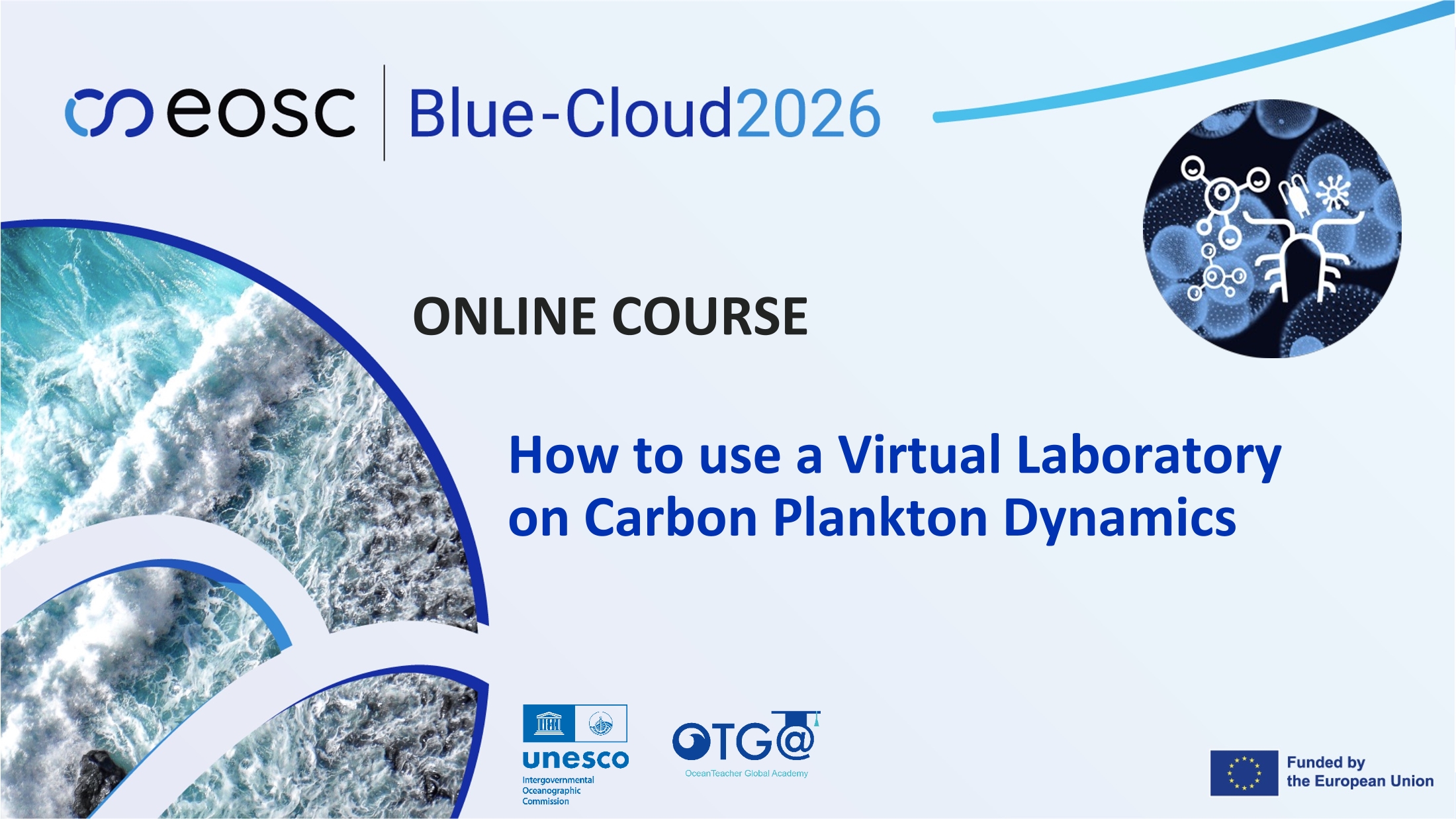
BC-VLab3*2025
How to use a Virtual Laboratory on Carbon Plankton Dynamics
This 4-hour course is designed to empower ocean scientists by providing a comprehensive understanding and practical skills in using a Carbon Plankton Dynamics Virtual Laboratory (VLab), running in Blue-Cloud Virtual Research Environment (VRE). Participants will learn how to explore carbon plankton data, patterns, and processes relevant to marine ecology using a virtual environment. Knowing that the carbon pump in marine ecosystems operates as a key mechanism for carbon dynamics, learning how to use a virtual carbon plankton model can provide support to enhance knowledge in marine life dynamics, as well as perform science-based decision-making. This course uses datasets and scenarios of the Belgian Part of the North Sea and the Gulf of Trieste to demonstrate the capabilities of the models, which can be applied and adapted for other regions and conditions.
The course aims to empower ocean scientists with a comprehensive understanding and practical skills in using a Virtual Laboratory (Vlab) on Carbon Plankton Dynamics within the Blue-Cloud VRE. By accessing various digital tools, you will be able to utilize models to study carbon plankton and apply them to make decisions related to the carbon pump mechanism based on data products and modelling outputs.
Learning outcomes
Upon successful completion of this training, participants will be able to:
- Identify key data collection processes and partners involved in research within the Belgian Part of the North Sea and the Gulf of Trieste and the development of the Carbon Plankton Dynamics Virtual Laboratory.
- Explain the importance of carbon plankton dynamics for scientific research, modeling, and oceanography.
- Define the purpose and functionalities, and the services provided by the Virtual Laboratory.
- Identify and utilize near-real-time data within the Virtual Laboratory for use in Nutrient–Phytoplankton–Zooplankton–Detritus (NPZD)-type models.
- Access relevant data from Blue-Cloud Data Discovery and Access service (DD&AS)
- Format data files for use in the Virtual Laboratory
- Operate the Virtual Laboratory (VLab) on Carbon Plankton Dynamics to simulate and analyze phytoplankton dynamics in the specified regions.
- Analyze model results related to the contributions of bottom-up and top-down drivers by the RShiny App within the Virtual Laboratory.
- Quantify the relative contributions of bottom-up and top-down drivers in phytoplankton dynamics using the NPZD-type model within the Virtual Laboratory.
- Interpret marine ecosystem management decisions based on model outputs from the Virtual Laboratory (VLab).
Course content
-
Module 1: Introduction to the Virtual Laboratory - This module introduces the Virtual Laboratory on Carbon Plankton Dynamics, its services, the relevance of carbon plankton dynamics, and key partners, focusing on their roles in data collection and modeling within the Belgian Part of the North Sea and Gulf of Trieste as a use case.
-
Module 2: Data Collection - This module guides on the types of data needed for the Virtual Laboratory on Carbon Plankton Dynamics, methods to access data (DD&AS), and the process of building and formatting data files, focusing on data from the Belgian Part of the North Sea and Gulf of Trieste.
-
Module 3: Discovering the Model - This module provides hands-on experience in operating the Virtual Laboratory on Carbon Plankton Dynamics using the handbook, focusing on how to use near-real-time data to run an NPZD-type model.
-
Module 4: RShiny App - This module teaches participants how to use the RShiny App in the Virtual Laboratory on Carbon Plankton Dynamics, focusing on visualizing and interpreting data related to phytoplankton dynamics in the Belgian Part of the North Sea and Gulf of Trieste.
Target audience
- Graduate students and postdoctoral researchers in marine and environmental sciences;
- IT professionals supporting research activities in scientific institutions; and
- Project managers and coordinators involved in research projects that utilise Virtual Research Environments (VREs).
Proficient in the following is required:
- The ability to be self-directed in learning new technology skills (e.g. following a step-by-step tutorial, online video help, or access to support to learn necessary skills)
- Basic computer skills
- Finding resources through search engines
Language of instruction
English
Instructors and Organizers
Content for this course was provided by:
This training is organized by the EU BlueCloud2026 project in collaboration with the UNESCO IOC OceanTeacher Global Academy, RTC Belgium, and contributions from project partners' experts (Flanders Marine Institute VLIZ, National Institute of Oceanography and Applied Geophysics (OGS) of Italy).
Blue-Cloud 2026 aims at a further evolution of this pilot ecosystem into a Federated European Ecosystem to deliver FAIR & Open data and analytical services, instrumental for deepening research of oceans, EU seas, coastal & inland waters. It develops a thematic marine extension to EOSC for open web-based science, serving the needs of the EU Blue Economy, Marine Environment and Marine Knowledge agendas.
Assessments and Certificate
This course contain a set of multiple-question automated assessments to evaluate your learning. Participants will be required to complete a pre and post self-assessment related to the course content, and be requested to fill out a feedback survey at the end of the course to reflect on your learning experience and identify areas for improvement. This will also provide valuable feedback for course teachers and organisers to enhance future training sessions.
To receive a Certificate of Completion, learners must:
- Achieve a minimum score of 70% on all quizzes.
- Complete every lesson, activity, and assessment.
- Complete the mandatory pre-test and post-test.
- Submit the required feedback form, which is mandatory for all OTGA courses.
Technology requirements
To complete this course, participants should have access to:
- Computer with a modern operating system (Windows, macOS, or Linux)
- Latest version of either Chrome, Edge, Firefox or Safari web browsers
- JavaScript and cookies enabled
- Broadband internet access (minimum bandwidth of 0.5 Mbps (Receive and Send)
- Speakers or headphones, Microphone
Course duration and format
For this first round, the course will be available online between 17 September 2025 and 31 July 2026. The estimated time to complete the self-paced course is approximately 4 hours.
Cost: This course has no tuition fees.
The training course is Funded by the European Union, with additional support from UNESCO IOC.
How to enrol
Please register on the OceanExpert website (www.oceanexpert.org). Once your OceanExpert account is approved (this is not done immediately), you can self-enrol in the course. If you already have an OceanExpert account, you can self-enrol in the course using your OceanExpert username and password.
First log-in OceanTeacher, then access the course page and click on self-enrolment. The enrolment key for all courses is VLab3*2025EN1
Contacts
- OTGA Secretariat: ioc.training@unesco.org
For any questions please contact the OTGA Secretariat always using the name of the course as the email subject.
Cancellation policy
In the event of cancellation of the course by the OTGA or its affiliates, we will provide notification of cancellation at least 7 days prior to the course date. In the event of cancellation by the attendee, we should receive notification of cancellation at least 7 days prior to the course date.
OceanExpert announcement: https://oceanexpert.org/event/4858
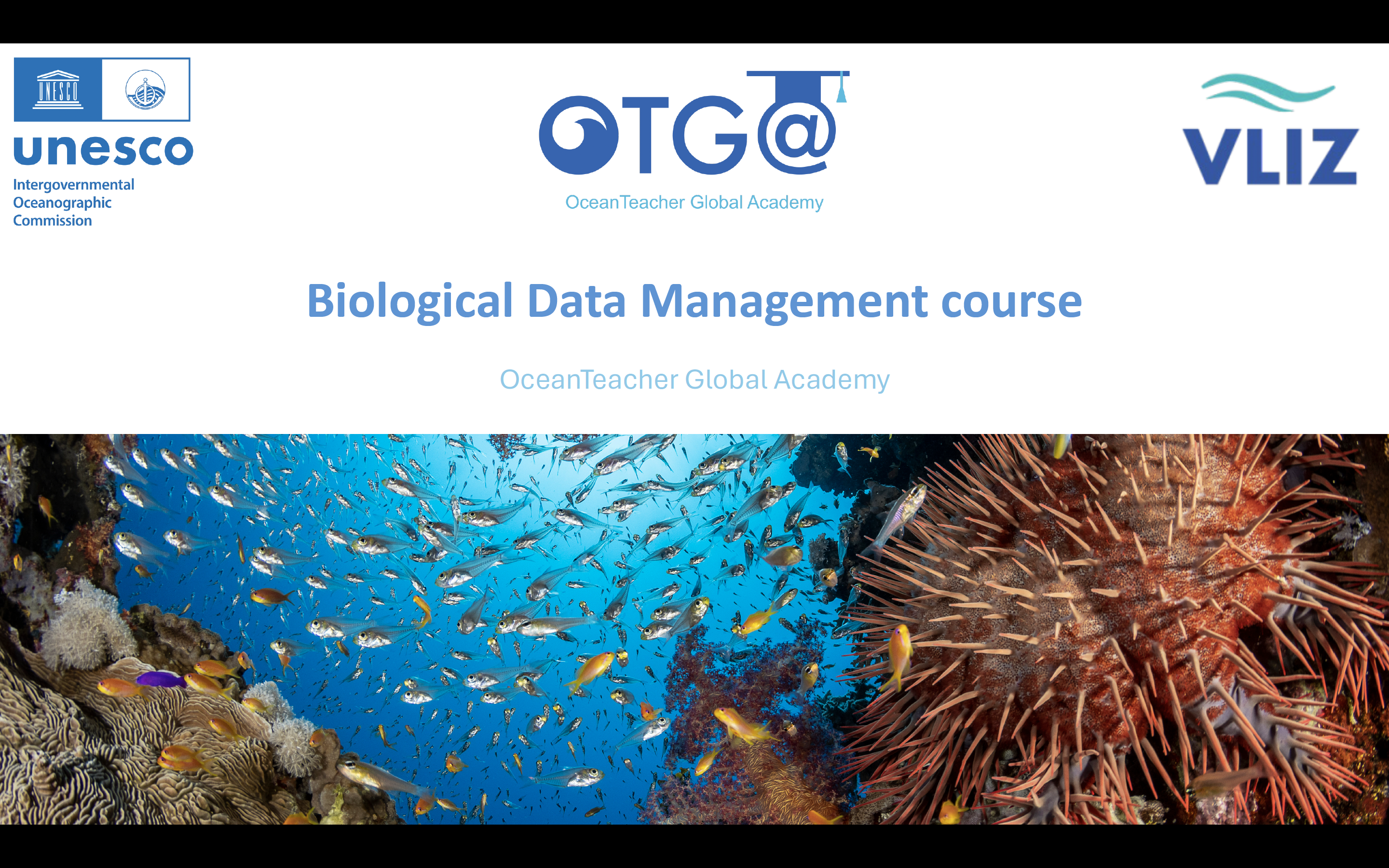
SP_BDM_2025-2
Biological Data Management 2025 (2nd cohort)
This course will provide a comprehensive introduction for the management and archive of marine biological data, including the guiding principles of biological data management and typical responsibilities for data managers. Several types of biological data will be tackled, including observational data, image-derived data and omics data and how these data can be formatted, standardized and quality controlled before being submitted to wider regional, national and international initiatives. Watch the video below for a brief overview and introduction.
Find all the information on how to enroll in this course on OceanExpert: https://oceanexpert.org/event/4846
As a follow-up of the bi-annually opened Ocean Data Management Training course, this course provides a comprehensive introduction for the management and archive of marine biological data, including the guiding principles of biological data management and typical responsibilities for data manager. Several types of biological data will be tackled, including observational data, image-derived data and omics data and how these data can be formatted, standardized and quality controlled before being submitted to wider regional, national and international initiatives.
By the end of this course, participants will be able to describe the core tasks required for the processing and distributing of biological marine data, explain the importance of following standards, both for the data and the metadata and identify possible data flow mechanisms and pathways to ensure their data are shared as widely as possible, thereby stimulating re-use.
Learning outcomes
Upon successful completion of this training, learners will be able to:
- Describe the core tasks required for the processing and distributing of biological marine data
- Explain the importance of following standards, both for the data and the metadata
- Identify possible data flow mechanisms and pathways to ensure their data are shared as widely as possible, thereby stimulating re-use
Course contents
Topics will include: Guiding principles in data management, Data formats, metadata, quality control, data policy, data sharing and publishing, and a main focus on data management of various types of biological data. It is organized in the following modules:
- Module 1. Guiding principles in data management
- Module 2. Fundamentals of marine biological data management and the Research Data Life Cycle
- Module 3. Best practices for data capture
- Module 4. Transferring your (meta)data to Darwin Core
- Module 5. Common issues with data format and quality
- Module 6. Preservation & publication of marine biological data
- Module 7. Imagery data
- Module 8. DNA-derived data
- Module 9. Data archaeology & rescuing historical data
Target audience
- Marine data managers
- NODC and/or ADU staff
- Data stewards and researchers
- Early career researchers
Language and computer skills required
- a good working knowledge of English
- basic computer skills
- the ability to find resources through search engines
- the ability to be self-directed in learning new technology skills (e.g. following a step-by-step tutorial, online video help, or access to support to learn necessary skills)
Instructors/Organisers
This course is organised by the OceanTeacher Global Academy with the assistance of the Flanders Marine Institute:
- Leen Vandepitte (general coordination) – Flanders Marine Institute (VLIZ)
- Laura Marquez
- Lynn Delgat
- Charlotte Dhondt
- Patricia Cabrera
- Carolien Knockaert
- Ruben Perez
- Salvador Fernandez
- Stefanie Dekeyzer
- Wim Decock
- Cyril Radermecker
Course duration and format:
The course will be delivered online between 3 September 2025 and 30 November 2025. The estimated time to complete the self-paced course is approximately 35 hours.
Learner Assessment:
This is a self-taught course that includes quizzes designed to help learners assess their own learning at regular intervals. In order to successfully complete the course and award a Certificate at the end, the following is mandatory:
-
- Complete all lessons in each Module of the course
- Complete all quizzes with 70% minimum score. For each quiz you are allowed 2 attempts and the highest grade is recorded
- Complete pre and post tests
Note: submitting the course feedback survey is mandatory to obtain the course certificate.
Technology requirements
To complete this course, participants should have access to:
- Computer with Windows or Mac operating system
- Latest version of either Chrome, Edge, Firefox, or Safari web browsers
How to enrol
Please register on the OceanExpert website (www.oceanexpert.org). Once your OceanExpert account is approved (this is not done immediately), you can self-enrol in the course. If you already have an OceanExpert account, you can self-enrol in the course using your OceanExpert username and password. Enrolment is available until 15 July 2025.
First log-in OceanTeacher, then access the course page and click on self-enrollment.
The enrolment key is BDM**2025-c2
For any questions please contact the OTGA Secretariat (ioc.training@unesco.org) always using the name of the course as email subject.
There are no tuition fees.
UNESCO is committed to promote equal access principles. Applications from minority or underrepresented groups are strongly encouraged.
Feedback survey
At the end of the course, you will be asked to fill out a feedback survey. This information will be used to improve future courses.
Cancellation policy
In the event of cancellation of the course by the OTGA or its affiliates, we will provide notification of cancellation at least 7 days prior to the course date. In the event of cancellation by the attendee, we should receive notification of cancellation at least 7 days prior to the course date.

BC-VLab2*2025
How to use a Virtual Laboratory on Coastal Ocean Currents from Observations
This 4-hour course is designed to empower ocean scientists by providing a comprehensive understanding and practical skills in using the Coastal Ocean Currents from Observations Virtual Laboratory (VLab) running in Blue-Cloud Virtual Research Environment (VRE).
In this course, participants will learn how to use a multi-source approach framework to study and reconstruct surface currents through a variational inverse method: Data-Interpolating Variational Analysis in n dimensions (DIVAnd). By accessing various tools for coastal ocean dynamics research, participants will be able to use variational interpolation techniques to reconstruct surface currents and understand application in relevant scenarios, such as oil spill modeling.
Learning outcomes
Upon successful completion of this training, participants will be able to:
- Provide information about the Coastal Currents from Observations Virtual Laboratory, including partners and their roles.
- Explain the importance of coastal ocean surface currents for scientific research, modeling, and oceanography.
- Define variational interpolation and explain its purpose within the Virtual Laboratory.
- Recognize the Julia programming language used for Data-Interpolating Variational Analysis in n dimensions (DIVAnd).
- Utilize direct and indirect surface current measurements within the Virtual Laboratory.
- Create a surface current data product using DIVAnd within the Virtual Laboratory.
- Describe the uses of an oil spill model in the context of coastal ocean currents.
- Detail about Decision Support System (DSS) and its applications
- Apply DSS WITOIL in the oil spill scenario and for Blue-Cloud DSS.
Course content
- Module 1: Introduction to the Virtual Laboratory - This module introduces the Coastal Currents from Observations VLab, its services, the relevance of coastal ocean currents, the basics of variational interpolation, and the role of Julia in DIVAnd.
- Module 2: Surface current data - This module offers guided learning about direct and indirect measurements of surface current data, including principles, strengths, and limitations.
- Module 3: Application of variational interpolation (DIVAnd) - This module provides hands-on experience in applying Data-Interpolating Variational Analysis in n dimensions (DIVAnd) to create surface current data products within the VLab, including setting parameters, running analysis, and visualizing the results.
- Module 4: Use case: oil spill model - This module offers a brief introduction to oil spill modeling and demonstrates the application of surface current data within this context, highlighting the importance of accurate current information for predicting oil spill trajectories.
Target audience
- Graduate students and postdoctoral researchers in marine and environmental sciences;
- IT professionals supporting research activities in scientific institutions; and
- Project managers and coordinators involved in research projects that utilise Virtual Research Environments (VREs).
Proficient in the following is required:
- The ability to be self-directed in learning new technology skills (e.g. following a step-by-step tutorial, online video help, or access to support to learn necessary skills)
- Basic computer skills
- Finding resources through search engines
Language of instruction
English
Instructors and Organizers
Content for this course was provided by:
This training is organized by the EU BlueCloud2026 project in collaboration with the UNESCO IOC OceanTeacher Global Academy, RTC Belgium, and contributions from project partners experts (University of Liège, GeoHydrodynamics and Environment Research; CMCC Foundation Euro-Mediterranean Center on Climate Change; and Flanders Marine Institute VLIZ).
Blue-Cloud 2026 aims at a further evolution of this pilot ecosystem into a Federated European Ecosystem to deliver FAIR & Open data and analytical services, instrumental for deepening research of oceans, EU seas, coastal & inland waters. It develops a thematic marine extension to EOSC for open web-based science, serving the needs of the EU Blue Economy, Marine Environment and Marine Knowledge agendas.
Assessments and Certificate
This course contain a set of multiple-question automated assessments to evaluate your learning. Participants will be required to complete a pre and post self-assessment related to the course content, and be requested to fill out a feedback survey at the end of the course to reflect on your learning experience and identify areas for improvement. This will also provide valuable feedback for course teachers and organisers to enhance future training sessions.
To receive a Certificate of Completion, learners must:
- Achieve a minimum score of 70% on all quizzes.
- Complete every lesson, activity, and assessment.
- Complete the mandatory pre-test and post-test.
- Submit the required feedback form, which is mandatory for all OTGA courses.
Technology requirements
To complete this course, participants should have access to:
- Computer with a modern operating system (Windows, macOS, or Linux)
- Latest version of either Chrome, Edge, Firefox or Safari web browsers
- JavaScript and cookies enabled
- Broadband internet access (minimum bandwidth of 0.5 Mbps (Receive and Send)
- Speakers or headphones, Microphone
Course duration and format
For this first round, the course will be available online between 17 September 2025 and 31 July 2026. The estimated time to complete the self-paced course is approximately 4 hours.
Cost: This course has no tuition fees.
The training course is Funded by the European Union, with additional support from UNESCO IOC.
How to enrol
Please register on the OceanExpert website (www.oceanexpert.org). Once your OceanExpert account is approved (this is not done immediately), you can self-enrol in the course. If you already have an OceanExpert account, you can self-enrol in the course using your OceanExpert username and password.
First log-in OceanTeacher, then access the course page and click on self-enrolment. The enrolment key for all courses is VLab2*2025EN1
Contacts
- OTGA Secretariat: ioc.training@unesco.org
For any questions please contact the OTGA Secretariat always using the name of the course as the email subject.
Cancellation policy
In the event of cancellation of the course by the OTGA or its affiliates, we will provide notification of cancellation at least 7 days prior to the course date. In the event of cancellation by the attendee, we should receive notification of cancellation at least 7 days prior to the course date.
OceanExpert announcement: https://oceanexpert.org/event/4857
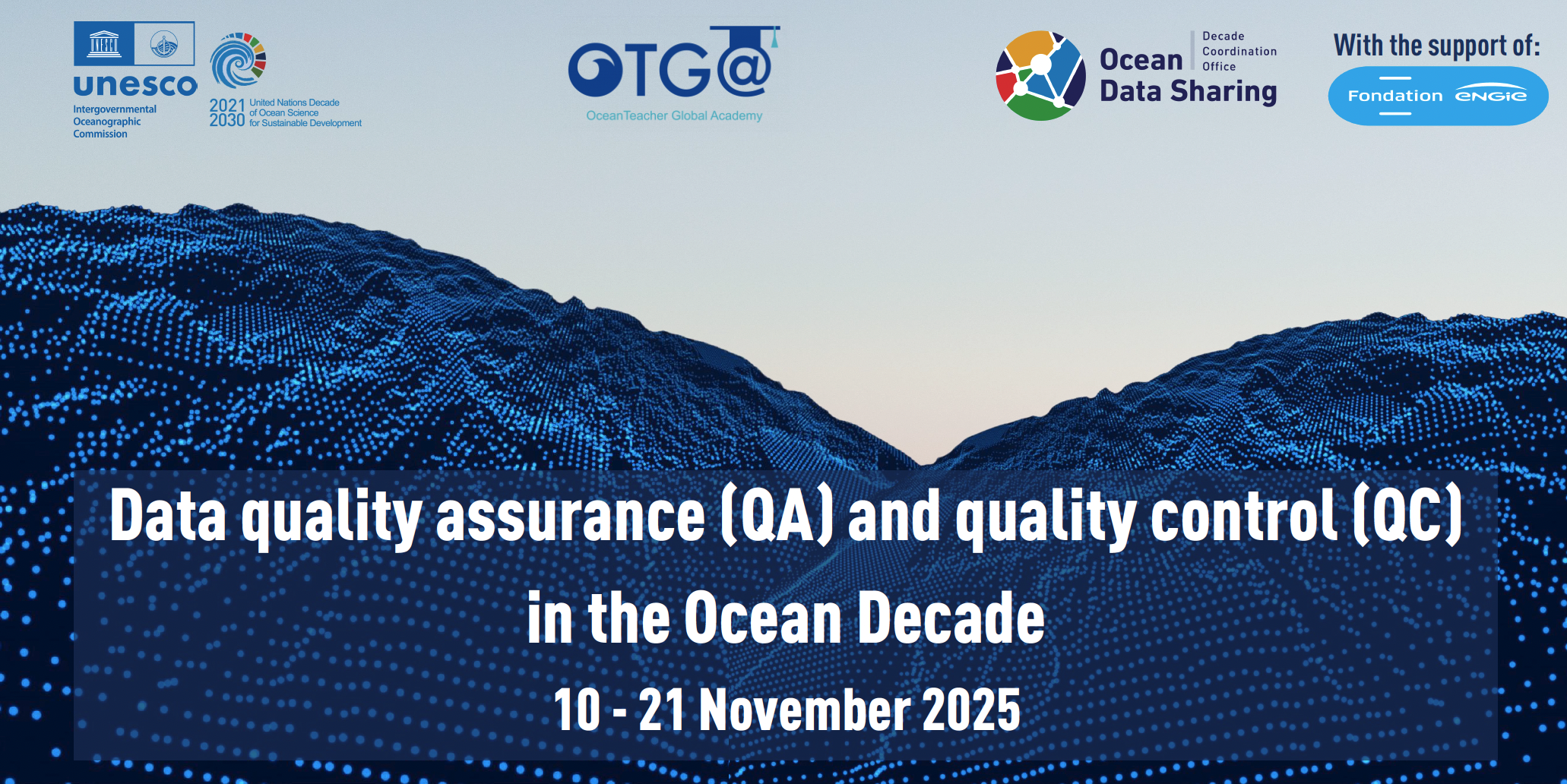
DCO-QA/QC
Data quality assurance (QA) and quality control (QC) in the Ocean Decade
Summary
Be able to describe QA and QC processes their ocean data have been through in metadata shared with global data ocean data systems
Understand issues in QC of ocean data from a range of thematic areas and be able to perform basic QC of these data
Actions
advised
Learning will be measured through short assessments and quizzes
Evaluation/Certificate:
Certificate will be issued, the criteria is to complete all lessons in each Module of the course and complete all quizzes (70% minimum score for each quiz)
Complete final course feedback survey
Technology requirements:
● Computer with Windows or Mac operating system
Pre-requisites: advisable: take the Ocean Data Management course (see www.oceanteacher.org) - available till 31st October 2025
Application process:
Please apply through this LINK. Apply before 15 September 2025 (23:59 CEST)
number of participants admitted: 40 people
costs: no cost
For any questions please contact the OTGA Secretariat (ioc.training@unesco.org) always using the name of the course as email subject.
There are no tuition fees.
UNESCO is committed to promote equal access principles. Applications from minority or underrepresented groups are strongly encouraged.
Feedback survey
At the end of the course, you will be asked to fill out a feedback survey. This information will be used to improve future courses.

Biomonitoring2025PT
Biomonitorização de substâncias e materiais perigosos em ecossistemas costeiros_2025
A monitorização da presença e dos efeitos de substâncias perigosas, e materiais como os microplásticos, é essencial para manter uma boa qualidade dos ecossistemas costeiros. As abordagens de monitorização adequadas necessitam de combinar um conjunto de avaliações químicas e biológicas. Este curso online foca-se em abordagens integradas químico-biológicos para a monitorização de substâncias perigosas, desde o planeamento até à recolha e análise de dados. Abrangerá períodos de aprendizagem assíncronos e síncronos, onde serão abordados conceitos teóricos e discutidos casos de estudo.
Resultados de aprendizagem
Após a conclusão bem-sucedida deste curso, os alunos serão capazes de:
-
Aumentar a compreensão dos princípios básicos subjacentes à biomonitorização
-
Aumentar as competências para planear e seleccionar locais de monitorização e bioindicadores adequados
-
Aumentar a compreensão das vantagens e desvantagens das diferentes medições químicas e biológicas
-
Avaliar os resultados e as desvantagens da abordagem adotada
-
Aumentar a capacidade de interpretar e selecionar boas práticas para a caracterização de base e acompanhamento dos ecossistemas costeiros
Conteúdo do curso
-
Princípios básicos de biomonitorização de substâncias perigosas
-
Planeamento e desenho experimental
-
Análise química e bioacumulação
-
Bioensaios e medições de biomarcadores
-
Avaliação da contaminação por microplásticos
-
Análise integrada de dados
Público alvo
Gestores ambientais que pretendam realizar a monitorização de rotina dos ecossistemas estuarinos e costeiros, investigadores marinhos, investigadores pós-doutoramento, estudantes de doutoramento, docentes de ensino básico e secundário, e outros profissionais interessados. Será dada prioridade a participantes originários de países de língua portuguesa. A UNESCO está empenhada em promover a igualdade de género. Por conseguinte, as candidaturas de mulheres são fortemente encorajadas.
Idioma do curso: Português
Pré-requisitos: Conhecimentos básicos de contaminação ambiental e toxicologia.
Instructores
Duração do curso e formato
O curso será ministrado online entre 3 de novembro a 8 de dezembro de 2025. O curso tem carga horária total de 15 horas.
Aulas síncronas
- completar todas as lições de cada Módulo do curso
- completar todos os questionários (pontuação mínima de 50% para cada questionário)
- finalizar o trabalho final prático
- responder a pesquisa de satisfação
O curso será ainda certificado pelo Conselho Científico-Pedagógico de Formação Contínua (Ministério da Educação, Ciência e Inovação de Portugal).
Requisitos tecnológicos
Processo de candidatura
O número de lugares disponíveis é limitado (50 vagas). As candidaturas terão início a partir de 26 de agosto de 2025.
Preencha o formulário de inscrição on-line disponível neste LINK. O prazo para submissão da candidatura é até 19 de setembro de 2025 (23:59 CEST: Central European Summer Time).
- Motivação: resumo até 300 palavras sobre a motivação para realizar o curso e como pretendem aplicar os conhecimentos adquiridos.
- País de origem (60% das vagas reservadas a participantes oriundos de países da CPLP).
- Equilíbrio de género dentre os candidatos.
Pesquisa de satisfação: Ao final do curso, você será solicitado a preencher uma pesquisa de feedback. Essas informações serão usadas para melhorar cursos futuros.
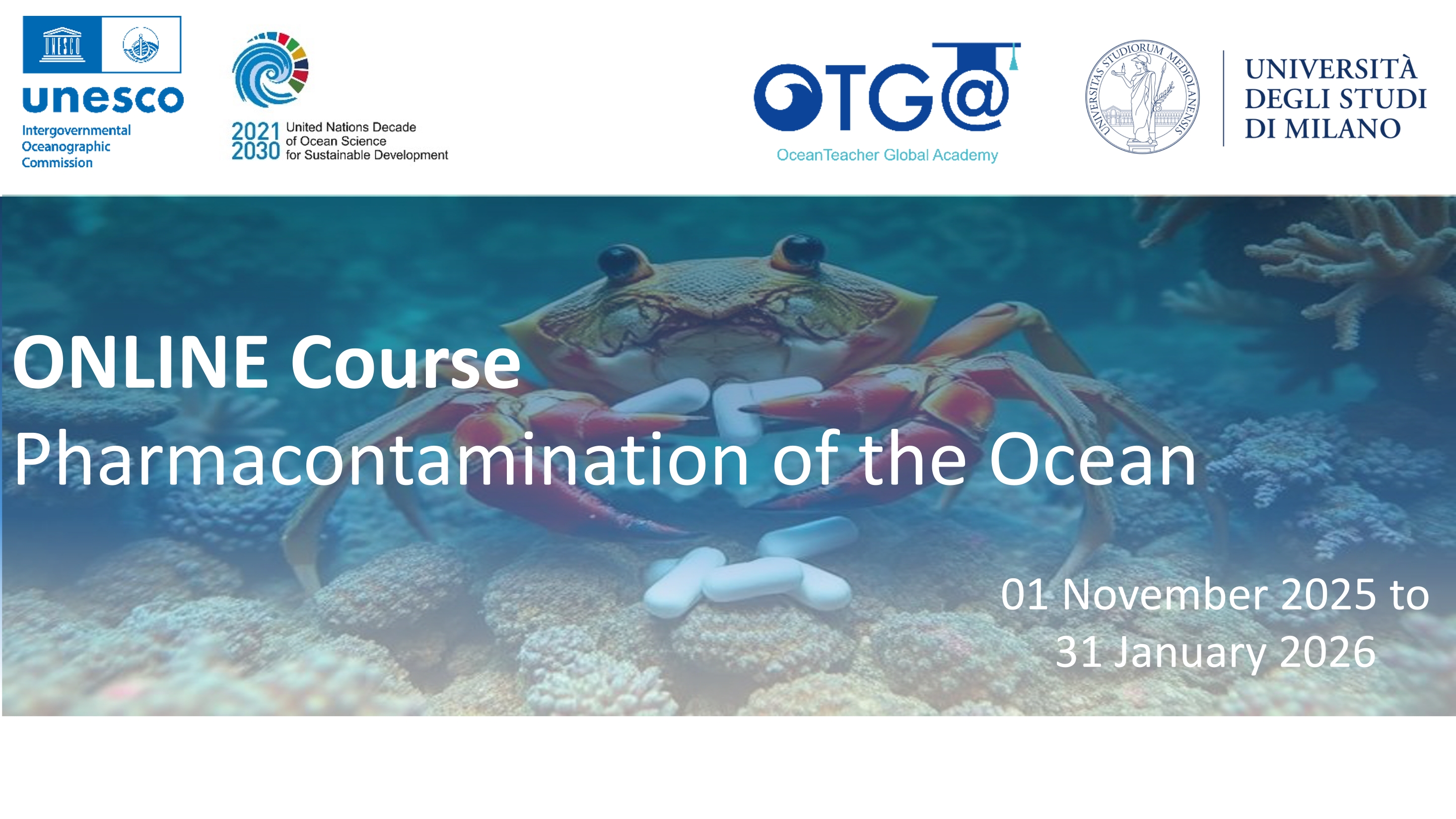
PharmaOcean-2025
Pharmacontamination of the Ocean
The Course aims to raise awareness and evaluate the current knowledge on pharmacontamiantion of the Ocean and its impact on marine life, human health and blue economy.
The Course is in line with the Ocean Decade Campaign and, in particular, with the SDG14 since it will inform citizens and professionals about the hidden danger of medicines spread in the ocean, pollutants capable of exerting a detrimental effect on the marine ecosystem.
Key contents will include topics about the magnitude of pharmacocontamination in the ocean; and ecopharmacovigilance and marine-pharmacovigilance as new emerging concepts.
Learning outcomes
By the end of the course, the participants are expected to be able to understand,analise and evaluate the importance of pharma-contamination, to categorize and detect the importance of the ocean on human health, and to create the future leaders in different ocean regions that are capable of sustaining crtiical thinking and to fight ocean pollution derived from pharmaceuticals to all society levels.
Target audience
The training is focused on undergraduate and postgraduate students (in Biology, Pharmacy, Medicine, Tourism, Engineering, Chemistry, Agronomy, and Veterinary), researchers, policy makers, and lecturers. Applications are open to everyone.
Pre-requisites
Participants must:
- Have prior knowledge about marine life and environment.
- A working knowledge of English.
Course content
- Módule 1 Introduction to marine eco-pharmacovigilance (4 h)
- Pharmacovigilance principles (30 min)
- Pharmacovigilance in rivers (1.5 h)
- Pharmacovigilance in seas/oceans (2 h)
- Módule 2 The impact of medicines pollution on marine biodiversity
- Evidence in terms of interferences on corals and algae metabolism due to medicines (2 h)
- Evidence in terms of interferences on fishes and mollusks metabolism due to medicines (2 h)
- Módule 3 The impact of medicines pollution on coastal environment and human health (6 h)
- Medicines-related pollution effect in fishing and aquaculture (2 h)
- Medicines microdoses and effect for human health (2 h)
- Sunscreens as pollutants (2 h)
- Módule 4 The Ocean contribution to Pharmacology and One Health (4 h)
- Traditional medicine derived from the Ocean (1 h)
- Veterinary medicines derived from the Ocean (1.5 h)
- Human health and ocean-related drug-discovery (1.5 h)
- Módule 5 Communication Strategies to Advocate Ocean Protection (2 h)
Language of instruction: English
Course Duration, Synchronous Sessions, and Format
This course is expected to be mainly self-paced, with an estimated total of 20 hours to complete all activities. No live sessions are planned.
Instructors
Prof. Arijana Meštrović
Organizers
This course is organized by the University of Milan (Research Center of Precision Medicine and Chronic Inflammation), and the UNESCO IOC OceanTeacher Global Academy RTC Belgium.
Application process and selection criteria
OTGA online application form. Before starting the online application process, applicants must: (a) create a profile in OceanExpert (www.oceanexpert.org); (b) prepare a short Curriculum Vitae; and (c) prepare a motivational statement highlighting the relevance of this course for the candidate's career (maximum 300 words).
A limited number of seats are available (approximately 50). Please complete the online application form available on this LINK [https://otga.wufoo.com/forms/m1er1ms20dgqsk3/]. The applications start on 12 August 2025. The deadline to submit the application is 20 September 2025. [CLOSED]
UNESCO is committed to promoting equal access principles. Applications from minority or underrepresented groups are strongly encouraged.
Assessment & Certificate
Participants will be required to complete all lessons, with an 80% passmark of the assignments. A certificate of completion will be issued for those who complete these requisites.
Contacts
- Course Coordinators: Giovanni Damiani (Giovanni.damiani1@unimi.it)
- OTGA Secretariat: ioc.training@unesco.org
Costs
Free of charge. There are no tuition fees.
The instructors will give the course voluntarily.
Cancellation policy
In the event of cancellation of the course by the OTGA or its affiliates, we will provide notification of cancellation at least 7 days prior to the course date. In the event of cancellation by the attendee, we should receive notification of cancellation at least 7 days prior to the course date.
Announcement: https://oceanexpert.org/event/4833

eDNA_Africa_2025
Environmental DNA (eDNA) Training for Africa and the Adjacent Island States
Environmental DNA (eDNA) sampling and analysis have become an increasingly popular tool for studying biodiversity and monitoring ecosystems. It provides a relatively easy, non-invasive method to scan environments; estimate number of species, assess biodiversity, and monitor changes in a community without having to collect organism samples. Additionally, eDNA has the potential to inform on the movements and habitat associations of endangered/rare species, migratory species, water quality, detecting and tracking invasive species, harmful algal blooms, pathogens, and parasites. eDNA uses traces of genetic materials that organisms leave behind in water, soil, or air. Regardless of its wide application, knowledge of this technique is still underused in several parts of the world, such as in Africa. Marine ecosystems of Africa and the adjacent island states are teeming with biodiversity, including 439 key marine biodiversity areas. These ecosystems are facing significant threats from climate change, overexploitation, invasive species, urbanization, and other factors, as such, impact on biodiversity. Therefore, there is an urgent need to accelerate the understanding of African biodiversity patterns and monitor ecosystems more efficiently. Implementing eDNA techniques in biodiversity assessment in African countries is a promising opportunity to maximize the conservation and management of marine life.
In this context, this blended training aims to provide participants with a comprehensive theoretical understanding of environmental DNA (eDNA) and its applications in environmental sciences. It will cover all relevant aspects from eDNA sampling, laboratory and bioinformatic analysis, data analysis of results and possible application. The participants will learn about the origins of eDNA, how it enters the environment, and its significance in measuring biodiversity. The training will give an overview of eDNA, including its definition and different ecosystems where it can be studied with a specific focus on marine ecosystems.
Venue
University of Ghana
General Learning Goals
By the end of the course, the participants are expected to have:
- Increased understanding of the eDNA technology and its practical application.
- Enhanced skills in the collection and preservation of eDNA samples.
- Practical knowledge and skills in the extraction of eDNA samples.
- Insights on the analysis of eDNA data, and use of bioinformatics tools.
- Knowledge of utilization of eDNA technique in assessing marine biodiversity and monitoring ecosystems.
This course includes an online preparation component where participants will learn how to:
- Explain what eDNA is, its sources, and its ecological significance.
- Describe workflows for eDNA sampling, preservation, laboratory analysis, and bioinformatics.
- Identify key challenges, limitations, and good practices in eDNA studies.
- Understand quality control (QC), data stewardship, and ethical considerations in eDNA research.
- Recognise how eDNA data can inform policy, conservation, and ecosystem monitoring in Africa’s marine environments.
Target audience
The training is focused on ocean practitioners from West and North African countries, including Early Ocean Career Professionals (ECOPs) and mid-career ocean scientists interested in and needing to use eDNA in their scientific or technical work.
Pre-requisites
Participants must:
-
Have prior knowledge of marine biodiversity sampling and monitoring.
-
Bring their laptop.
-
A working knowledge of English.
-
Applicants must be from West or North Africa.
Course content
Module 1: Foundations of Environmental DNA (eDNA) Science
Module 2: eDNA-Omics and Their Applications
Module 3: eDNA Workflows and Practical Considerations
Module 4: eDNA Bioinformatics Analysis
Module 5: Data Interpretation, Bias, and Policy Relevance
All these theoretical modules will be complemented by targeted hands-on activities for 1 week, face-to-face training in Ghana.
Language of instruction: English
Course Duration, Synchronous Sessions, and Format
The course will take place face-to-face between 3 to 7 November, 2025, with a duration of approximately 40 hours.
The course has an online learning component to be completed before the onsite classes of approximately 12h.
Participants will be required to:
- Complete online self-paced learning activities before the onsite classes.
- Familiarize themselves with the documentation and methods shared by the group previously.
Instructors
Organizers
Application process and selection criteria
OTGA online application form. Before starting the online application process, applicants must: (a) create a profile in OceanExpert (www.oceanexpert.org); (b) prepare a Curriculum Vitae; and (c) prepare a motivational statement highlighting the relevance of this course for the candidate's career (maximum 300 words).
A limited number of seats are available (20 seats). Please complete the online application form available on this LINK [https://otga.wufoo.com/forms/m164fy0026gyzv/]. The applications start on 5 August 2025. The deadline to submit the application is Sunday 24 August 2025.
UNESCO is committed to promoting equal access principles. Applications from minority or underrepresented groups are strongly encouraged.
Assessment & Certificate
Participants will be required to complete a preparation phase online before the course, attend all sessions of the face-to-face training in Ghana, and successfully complete the course activities and assessments. A certificate of completion will be issued for those who complete these requisites.
Contacts
- Course Coordinators: Ibukun Adewumi i.adewumi@unesco.org; Edwin Mwashinga e.mwashinga@unesco.org;
- RTC Ghana Coordinator: Benjamin Botwe
- OTGA Secretariat: ioc.training@unesco.org
Costs
Free of charge. There are no tuition fees.
For the selected participants, course organizers will cover the costs of travel, accommodation, local transport, and food. Eligibility for support requires meeting the pre-requisites and target audience.
The instructors will give the course voluntarily.
Cancellation policy
In the event of cancellation of the course by the OTGA or its affiliates, we will provide notification of cancellation at least 7 days prior to the course date. In the event of cancellation by the attendee, we should receive notification of cancellation at least 7 days prior to the course date.
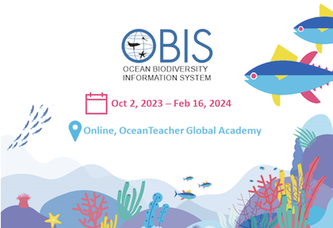
OBIS2023EN
Contributing and publishing datasets to OBIS (self-paced)
This training course is self-guided and designed to teach learners how to structure datasets to contribute to OBIS. The course will guide users step-by-step through the OBIS data life cycle, including: identifying an appropriate data structure, applying Darwin Core Archive formatting, conducting quality control steps, publishing data, and accessing data from OBIS. Watch the video below for a brief overview and introduction by the course instructor, Elizabeth Lawrence.
This course was open for registrations from 02 October 2023 - 16 February 2024. https://oceanexpert.org/event/3983
Since 17 February, participation in this course is restricted to staff and collaborators in OBIS Nodes, invited by OBIS Secretariat: https://oceanexpert.org/event/4754

MP_2025
Microplástico: natureza, ocorrência e impacto ambiental_2025
O curso visa fornecer os fundamentos da investigação sobre microplásticos para leigos de todas as áreas. A dinâmica consiste basicamente em fornecer conhecimento consolidado e atualizado sobre o tema e abrir espaço para debates sobre as consequências sociais e ambientais da poluição plástica.
Resultados da aprendizagem
1. Compreender o papel dos polímeros e aditivos nos microplásticos, o mecanismo de fragmentação e as categorias primária e secundária.
2.Compreender os fundamentos das propriedades dos polímeros, especialmente os relevantes para a compreensão do seu potencial impacto ambiental.
3.º Acompanhar os pontos técnicos em debate nas iniciativas políticas atuais, em ação ou em desenvolvimento.
Conteúdo do curso
1. Introdução às definições de polímeros e histórico da poluição plástica; Definição e categorias de microplásticos; Formação de microplásticos e principais fontes e ocorrência.
2. Fundamentos da ciência dos polímeros para compreender as suas propriedades físicas e utilização universal: transição vítrea, fusão e cristalização; difusão; aditivos; degradação.
3.º Ciência dos polímeros por detrás dos microplásticos: Fragilidade e fragmentação, lixiviação, dimensões micro e nanométricas, formulação.
4. Monitorização e Análise: Recolha, Separação; Caracterização; Identificação; Contaminação cruzada e GQ/CQ.
5. Toxicidade: causas potenciais, Substâncias Adicionadas Intencionalmente (IAS) e Substâncias Adicionadas Não Intencionalmente (NIAS); Sorção e dessorção; Impacto mecânico; Separação.
6.º Políticas regulamentares: as iniciativas políticas atuais e em desenvolvimento que abordam a questão da poluição por plástico.
Público-alvo e pré-requisitos
O público-alvo são todos os interessados no tema da poluição por plástico. O pré-requisito desejável, mas não obrigatório, é o Ensino Secundário completo.
Nota: Todas as aulas são preparadas para alunos sem conhecimentos específicos de química, física ou biologia. A história dos cursos anteriores no Brasil contou com a participação significativa de profissionais das Ciências Humanas e Sociais e de um vasto leque de setores públicos.
Idioma
português
Instrutores
Walter Ruggeri Waldman – Federal University of Sao Carlos
Ana Carolina Moreira de Oliveira – Our Blue Hands
Natalia Woppe – Federal University of Sao Carlos
informações práticas
O curso terá 10 sessões síncronas (de aproximadamente 2 horas cada). Estas sessões são altamente recomendadas, mas não obrigatórias para a conclusão do curso. As gravações serão disponibilizadas a todos os participantes. As sessões síncronas serão uma continuação das aulas autodirigidas, onde o conteúdo será discutido.
10 aulas síncronas (2 horas cada), 10 aulas assíncronas (1,5 horas cada) e leitura extra da literatura recomendada (1 hora por semana).
duração do curso 45 horas
Avaliação do aluno -Avaliação/Certificado
Questionários - Passmark: 70%
Ao final do curso, você deverá preencher uma pesquisa de feedback. Essas informações serão usadas para aprimorar cursos futuros.
Requisitos de tecnologia
Utilização da plataforma OTGA, YouTube e Google Docs. Todas as plataformas são abertas.
Nenhum pré-requisito
sem processo de inscrição - inscrição aberta a partir de 5 de agosto
Inscrições até 26 de agosto, uma semana antes do início do curso (2 de setembro). enrolment code: xxx
sem número máximo de participantes
sem custos
Em caso de cancelamento do curso pela OTGA ou afiliados, notificaremos o cancelamento pelo menos 7 dias antes da data do curso. Em caso de cancelamento pelo participante, deveremos receber notificação de cancelamento pelo menos 7 dias antes da data do curso.

COES-WIO2025
Coastal Ocean Environment School in Western Indian Ocean (COES-WIO) on Coastal and Oceanographic Processes, Marine Pollution, Fisheries and Data Management
The Coastal Ocean Environment School in Western Indian Ocean (COES-WIO) in Kenya is thrilled to open applications for its inaugural program. Modelled after the successful Coastal Ocean Environment Summer School in Nigeria and Ghana (COESSING; https://coessing.org/), which has fostered oceanography skills and capacity across West Africa since 2015, COES-WIO offers a transformative learning experience in ocean science.
The program includes an immersive, in-person week from 21st to 27th September 2025 in Mombasa, Kenya, where participants will engage in hands-on activities, including fieldwork, laboratory analysis, data interpretation, and presentations. This experience is designed to enhance practical skills, connect with experts, and build networks that support continued growth and international collaboration in ocean sciences. Participants will have the opportunity to learn advanced ocean-related practices and global frameworks, important tools to advance capacity in research, management, and services.
The training is developed as a pre-activity of the 13th Western Indian Ocean Marine Science Association Symposium, and is organized in the context of the United Nations Decade of Ocean Science for Sustainable Development (2021-2030). The school will gather 75 international young professionals from the WIO region.
Venue: Mombasa, Kenya
The training will take place at the Technical University of Mombasa (TUM) with some sessions hosted at Pwani University and Kenya Marine and Fisheries Research Institute (KMFRI).
Learning outcomes
By the end of the course, the learners are expected to:
- Be familiar with field surveys and experimental techniques within the different project tracks.
- Understand how to use different equipment for physical and biological data collection within the different project tracks.
- Be familiar with processes involved in the different project tracks including fish handling, postharvest processes, marine plastics and laboratory sample processes.
- Develop reports to communicate the scientific concepts learnt in the various project tracks.
Course contents
- Small Scale Fisheries & Postharvest losses, Mariculture potential in the WIO
- Climate change - Beach Erosion & Coastal Processes
- Physical and Chemical Oceanography
- Marine Plastics & Pollution
- Ecological Survey Techniques and Data Management
Target audience
Students (Bachelors, masters, PhD), early-career researchers, and professionals in marine science and oceanography-related fields, including sectoral stakeholders from the WIO region.
Language of instruction: English
Moderators and Instructors
- Cosmas Munga, TUM
- Ali Maarifa, PU
- Brian Arbic, U-Michigan
- Janae' Collier, U-Michigan
- Eben Nyadjro, Mississippi State University
- Richmond Q., Plastic Punch, Ghana
- John Walter, UNILAG
- Audrey Delpech, CNRS France
- Chenzhu (William) Xu, Oregon State University
- Peter Knoop, U-Michigan
- Tracey Schafer, U-Michigan
- Gabriel Akoko Juma, Alfred Wegener Institute
- Joseph Tunje, PU
- Francis Mutuku, TUM
- Saeed Mwaguni, TUM
- David Mirera, KMFRI
- John Mbugani, UDOM
- Clara Rivers, U-Copenhagen
- Anthony Nzioka, KMFRI
- Peter Odote, KMFRI-Associate
- Frank Mirobo, UDOM
- Nimit Kumar
- Ritabrata Thakur, IIT New Delhi
Organizers
The training is organized by the University of Michigan (UoM), USA in collaboration with Technical University of Mombasa (TUM), Pwani University (PU), and Kenya Marine and Fisheries Research Institute (KMFRI).
Activities were made possible with additional support of the Western Indian Ocean Marine Science Association, BlueCaD Project – Early Career Ocean Professionals Programme, Western Indian Ocean Early Career Scientists Network (WIO-ECSN), and UNESCO IOC OceanTeacher Global Academy and Ocean Decade Capacity Development Facility.
Course duration and format:
In-person course, with a total of 42 hours of training time involving on-site activities.
Please note that some project tracks might have about 4 hours of synchronous (online) sessions to prepare the students for on-site activities. These sessions will be communicated to the respective learners after selection. The online sessions will take place from 17:00 HRS to 19:00 HRS, Nairobi time to allow for participation of teachers and students from a wide range of time zones.
Each project track will have 15 selected based on preference, during application.
A detailed timetable will be shared with the students 3 weeks prior to the course.
Learner Assessment and Certificate
The certificate will be issued after the completion and full attendance of the activities in the respective project tracks, including successfully completing the group presentations.
Note: submitting the course feedback survey is mandatory to obtain the course certificate.
Pre-requisites and requirements
To complete this course, you should have access to:
- A laptop from which the students can perform tasks and join the synchronous sessions (you will be required to carry your laptop to the training site).
- Latest version of either Chrome, Edge, Firefox, or Safari web browsers
- Linux (preferably Ubuntu 16.04 or above)
- Access to the Internet for online sessions
- Availability to travel and take part in the 1-week onsite course in Malta
Prior to the course, the learners will be required to:
- Register and familiarize yourself with the OTGA platform.
- Download and install R and other software that will be communicated.
- Download the datasets that will be uploaded on the OTGA platform
- Do a self-introduction on the OTGA platform and highlight their expectations
- Read the course materials notes that will be prepared by the lecturers.
- Confirm their availability for the in-person training in Malta
How to apply
This course has a limited number of participants.
Please complete the online application form available on this LINK. The applications start on 2 July 2025 and the deadline to submit is 15 July 2025 (23:59 CEST: Central European Summer Time).UNESCO is committed to promoting equal access principles. Applications from minority or underrepresented groups are strongly encouraged.
Selection criteria
The application and selection process will be coordinated by the organizers. Participants will be selected according to the following criteria:
Gender balance
Nationalities of or studying in WIO countries, that is; from Somalia, Kenya, Tanzania, Mozambique, South Africa, Comoros, Madagascar, Seychelles, Mauritius and Reunion.
Geographical representation
Age range: up to 35 years old
Background: all the sectors are encouraged to apply. We will pay attention to create an interdisciplinary group, and distribute learners in the different project tracks based on preference.
Contacts
- Course Coordinators: Gabriel Juma gabriel.akoko.juma@awi.de and Cosmas Munga ckamunga2014@tum.ac.ke
- OTGA Secretariat: ioc.training@unesco.org
Costs
This training has no tuition fees.
15 grants are available to cover the travel costs (for non-Kenyan participants). Accommodation for the whole week is provided to all the participants; breakfasts, lunches and dinners are included. Other participants will have to cover the costs of travel.
Feedback survey:
At the end of the course, you will be asked to fill out a feedback survey. This information will be used to improve future courses.
Cancellation policy
In the event of cancellation of the course by the OTGA or its affiliates, we will provide notification of cancellation at least 7 days prior to the course date. In the event of cancellation by the attendee, we should receive notification of cancellation at least 7 days prior to the course date.
OceanExpert Announcement: https://oceanexpert.org/event/4820
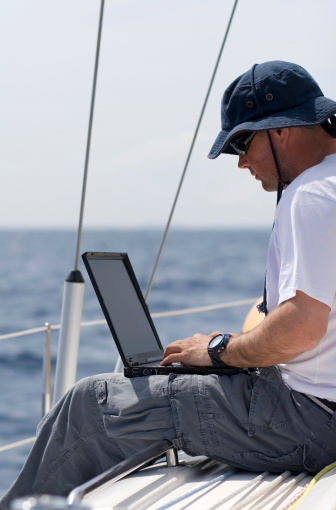
SP_ODM2025-2
Ocean Data Management 2025 (2nd cohort)
This online, fully self-paced training course provides a comprehensive introduction to the management of marine data, including the guiding principles of data management and typical responsibilities for data managers, data stewards and scientists.
This course is developed by, and for, marine data managers, data stewards and researchers, working in institutions responsible for the collection and good management of marine data.
During this training course, you will be introduced to several general aspects related to the management of marine data, including, metadata, quality control, data policy, data sharing and publishing, data management plans and the research data life cycle. By the end of this course, you will be able to describe and implement the core tasks required for the processing of marine data, explain the importance of metadata, advise researchers on the research data life cycle and explain why a good data management plan is key from the very first initiation steps of a project.
Details:
Learning outcomes
By the end of this training, participants should be able to:
- Describe the phases of the Research Data Life Cycle
- Explain the concept of a Data Management Plan
- Explain the concept and importance of metadata
- identify suitable file formats for data preservation and sharing
- Identify appropriate repositories for your data
- Summarise the goal of assigning a data licence
- Explain the common concerns related to data reuse
Course contents
- General overview of data management, its principles and organisation
- Research Data Life Cycle
- Data Management Plan
- Open & FAIR data
- Data licences
- Metadata
- Data standards & quality control
Target audience
Marine data managers, data stewards and researchers, working in institutions responsible for the collection and good management of marine data.
Language and computer skills required (Applicants are expected to have):
- a good working knowledge of English
- basic computer skills
- the ability to find resources through search engines
- the ability to be self-directed in learning new technology skills (e.g. following a step-by-step tutorial, online video help, or access to support to learn necessary skills)
Instructors/Organisers
This course is organised by the OceanTeacher Global Academy with the assistance of the Flanders Marine Institute.
Course duration and format:
The course will be delivered online between 1 July 2025 and 31 October 2025. The estimated time to complete the self-paced course is approximately 35 hours.
Learner Assessment:
This is a self-taught course that includes quizzes designed to help learners assess their own learning at regular intervals. In order to successfully complete the course and be awarded a Certificate at the end, the following is mandatory:
- complete all lessons in each Module of the course;
- successfully complete the pre- and post-assessment;
- complete all quizzes (70% minimum score for each quiz).
Note: submitting the course feedback survey is mandatory to obtain the course certificate.
Technology requirements
To complete this course, participants should have access to:
- Computer with Windows or Mac operating system
- Latest version of either Chrome, Edge, Firefox, or Safari web browsers
How to enroll
Please register on the OceanExpert website (www.oceanexpert.org). Once your OceanExpert account is approved (this is not done immediately), you can self-enrol in the course. If you already have an OceanExpert account, you can self-enroll in the course using your OceanExpert username and password. Enrolment is available from 1 July until 15 October 2025.
First log in OceanTeacher, then access the course page and click on self-enrollment.
The enrolment key is ODM*2025
For any questions please contact the OTGA Secretariat (ioc.training@unesco.org) always using the name of the course as email subject.
There are no tuition fees.
UNESCO is committed to promote equal access principles. Applications from minority or underrepresented groups are strongly encouraged.
Feedback survey
At the end of the course, you will be asked to fill out a feedback survey. This information will be used to improve future courses.
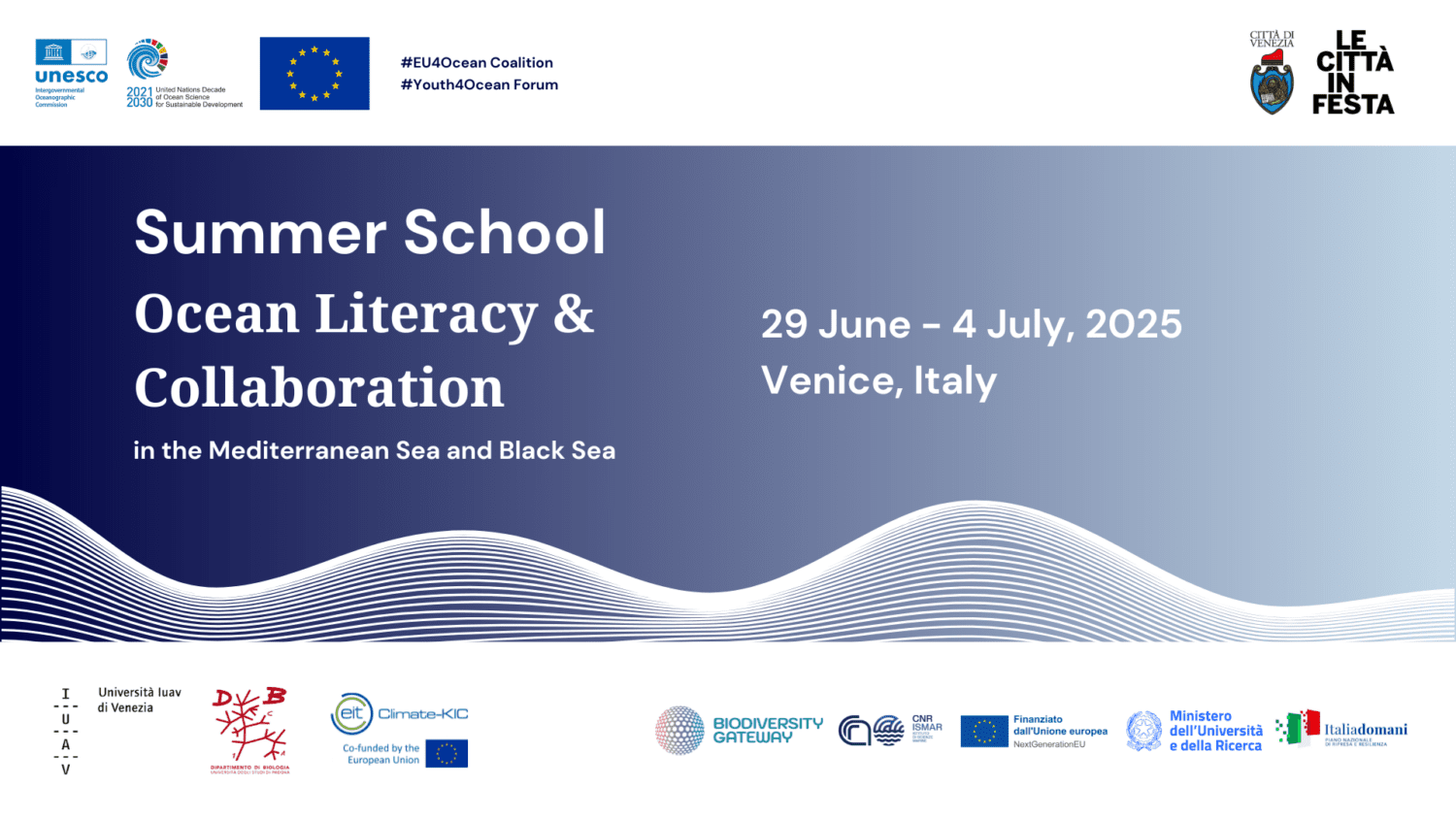
OLSSchool*Venice2025
Summer School on Ocean Literacy and Collaboration on Nature-Based Solutions for the Mediterranean and Black Seas
The EU4Ocean Summer School on Ocean Literacy & Collaboration is a 6-day training (29 - 4 July, 2025) dedicated to thinking about how to better collaborate on ocean-related projects. It is composed of theoretical lectures and practical training for early career ocean professionals (ECOPs) on ocean literacy and collaboration on nature-based solutions for the Mediterranean and Black Seas.
The training is developed under the European Ocean Coalition (EU4Ocean) framework of the European Commission and is organized in the context of the United Nations Decade of Ocean Science for Sustainable Development (2021-2030). The Summer School will gather 25 international young professionals.
Info: https://oceanliteracy.unesco.org/eu4ocean-summer-school-on-ocean-literacy-collaboration-venice-2025/
Location: Venice, Italy
Learning outcomes
At the end of this training, learners should:
- How to effectively collaborate on the development of ocean-related projects;
- How to improve communication and storytelling in transdisciplinary and multicultural environments;
- How to collaborate and advance ocean literacy for nature-based solutions in the Mediterranean and Black Seas;
- How to deal with local hot-topics and how to engage with local institutions and stakeholders;
- To become familiar with the objectives and actions of the EU4Ocean Coalition and Youth4Ocean Forum and scale up their efforts, under the framework of the UN Ocean Decade.
Course content
- UN Ocean Decade, UNESCO-IOC, EU4Ocean and Youth4Ocean Forum overview.
- Theoretical lectures about local climate adaptations, nature-based solutions, development and management of ocean conservation project (KPIs, stakeholder identification and engagement).
- Field activities: architectural and historical tour of the city of Venice, hands-on workshop of marine spatial planning, tour of the National Research Council venue, in field tour of Lazzaretto Nuovo and its Sentiero delle Barene – Saltmarsh trail, to assess the different efficacy of ecosystem services provided by natural and artificial saltmarshes.
- Focus on Challenge 10: shaping ocean sensitivity through arts and culture.
- Soft skills: empathy and multicultural collaboration, scientific storytelling and public speaking for marine conservation and public awareness.
Target audience: Early Career Ocean Professionals, master and PhD students with mixed and interdisciplinary backgrounds.
Language: English
Instructors:
- Francesca Santoro, Senior Programme Officer (Ocean Literacy), UNESCO-IOC
- Valentina Lovat, Associate Programme Specialists of UNESCO-IOC, focal point for youth
- Gaia Maria Sole Intonti, Associate Programme Specialists of UNESCO-IOC, focal point for educational resources
- Jerneja Penca, Mediterranean Institute for Environmental Studies
- Anna Maria Marino, Youth4Ocean representative
- Raffaele Dessì, architect and historian
- Francesco Musco, IUAV University
- Fabio Carella, IUAV University
- Folco Soffietti, IUAV University
- Vittore Negretto, IUAV University
- Maria Loloni, EIT – Climate KIC
- Giorgio Castellan - CNR
- Simone Armeli Minicante - CNR
- Christian Toson - CNR
- Laura Cannarozzi - CNR
- Alberto Barausse, University of Padova
- Lucy Cathcart-Frödén, Sonic and Community Art
- Therese Carnemalm, Ocean Ambassador for Bauhaus of the Seas Sails project
- Federico Girotto, ONOFF designer
- Representative from Dotdotdot Company (TBD)
Organizers
UNESCO-IOC, Ocean Literacy team, based at the Venice Regional Bureau for Science and Culture
Venice Municipality
CNR
IUAV
Universitty of Padova
Course duration and format
Blended course, with a total of 51 hours of training time between online studies and in-person activities.
Certificate and Learner Assessment
The certificate will be issued after the completion and full attendance of the activities planned online and onsite, including successfully completing the work group presentation.
Pre-requisites and requirements
B2 level of English.
Application process
The application process was coordinated by the organizers. Participants have been selected according to the following criteria:
- Gender balance
- Geographical representation
- Age range: up to 35 years old
- Background: all the sectors are encouraged to apply. We will pay attention to create an interdisciplinary group.
- Priority will be given to youth from the Mediterranean Sea and Black Sea, as well as members of the Y4O Forum and ECOPs
Costs
This training has no tuition fees.
5 grants are available to cover the travel costs; accommodation for the whole week is provided to all the participants; breakfasts, lunches and 2 social dinners are included. Participants will have to cover the costs of travel and dinners (excluded 2 social dinners offered by the organizers)
Feedback survey
At the end of the course, you will be asked to fill out a feedback survey. This information will be used to improve future courses.
Contacts
For any questions, please contact OTGA Secretariat (ioc.training@unesco.org) or Gaia Maria Sole Intonti (gm.intonti@unesco.org) always using the name of the course as e-mail subject.
Cancellation policy
In the event of cancellation of the course by the OTGA or its affiliates, we will provide notification of cancellation at least 7 days prior to the course date. In the event of cancellation by the attendee, we should receive notification of cancellation at least 7 days prior to the course date.
